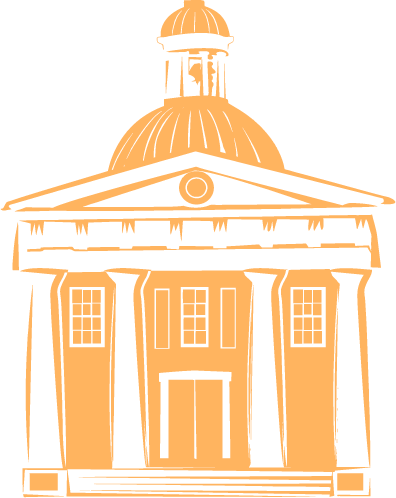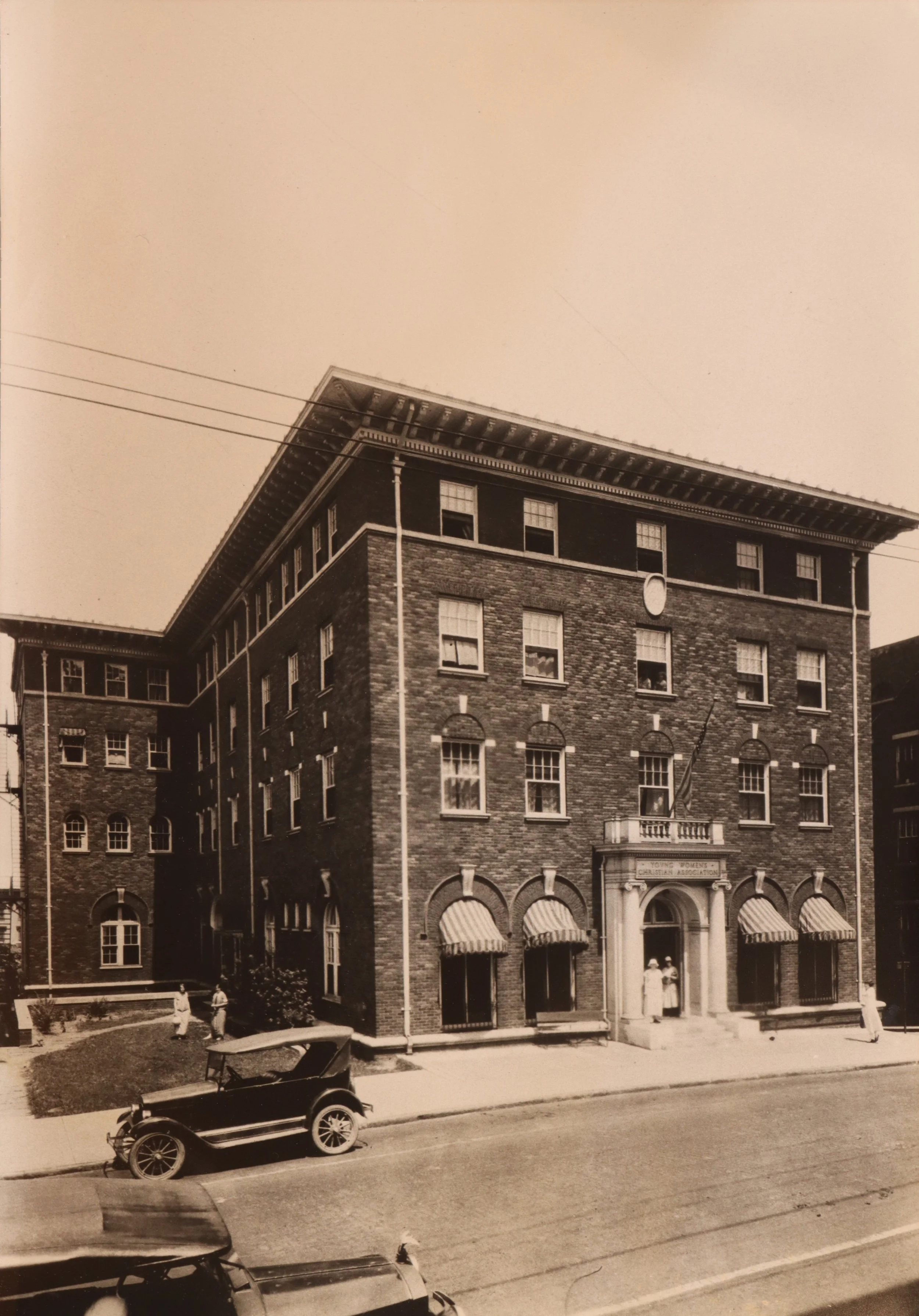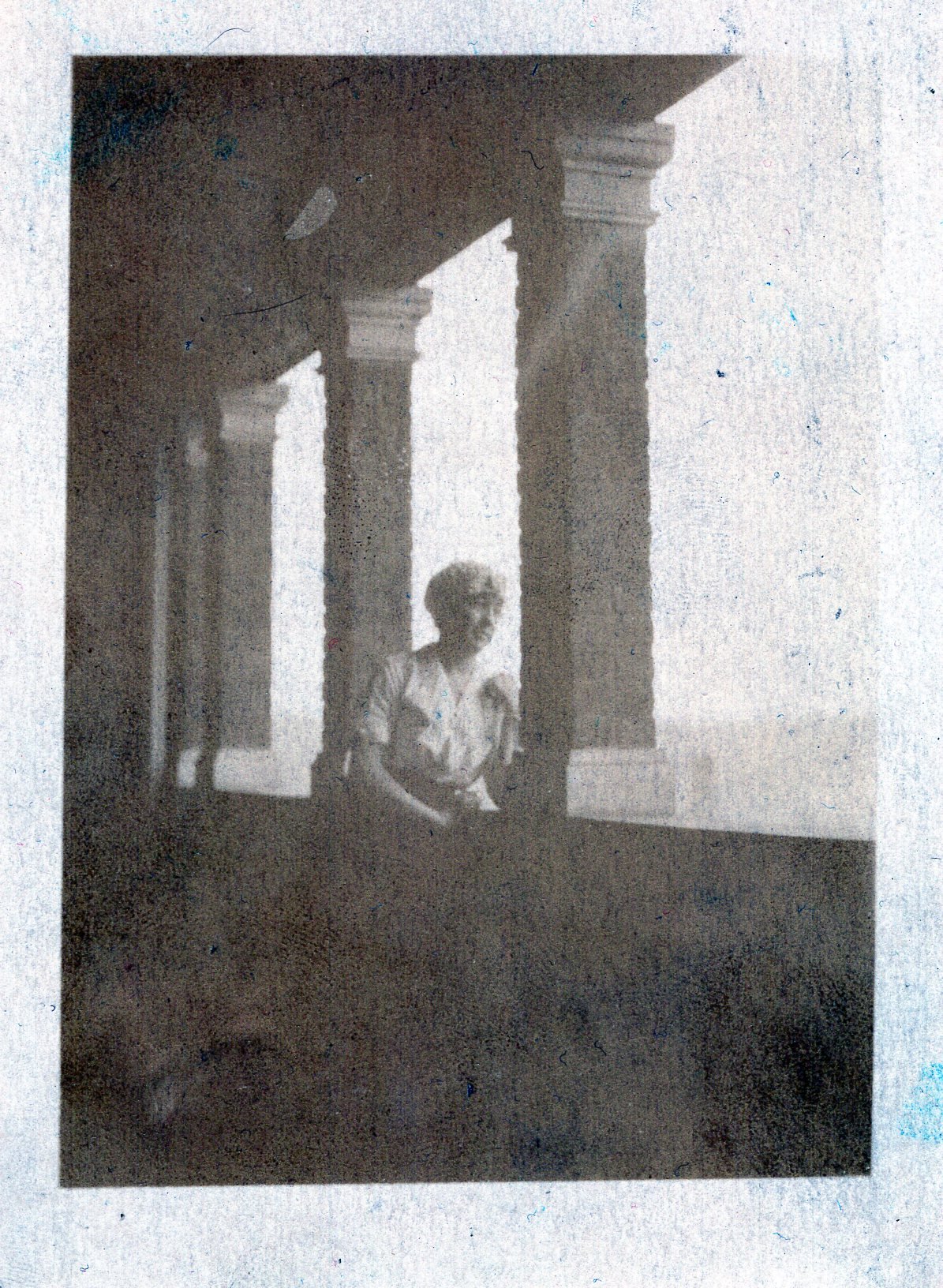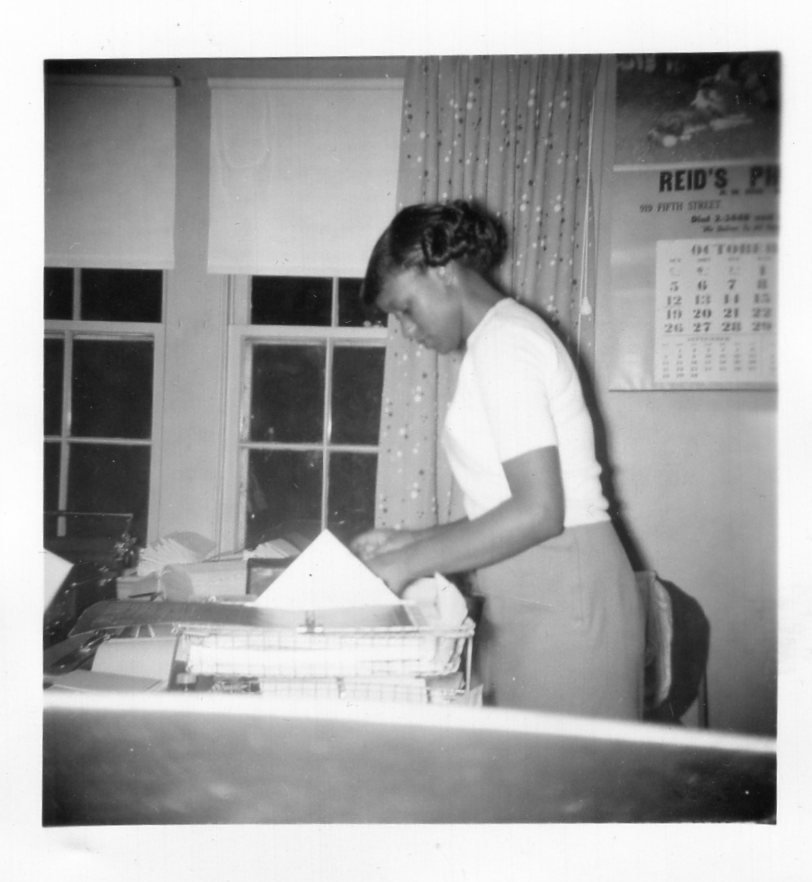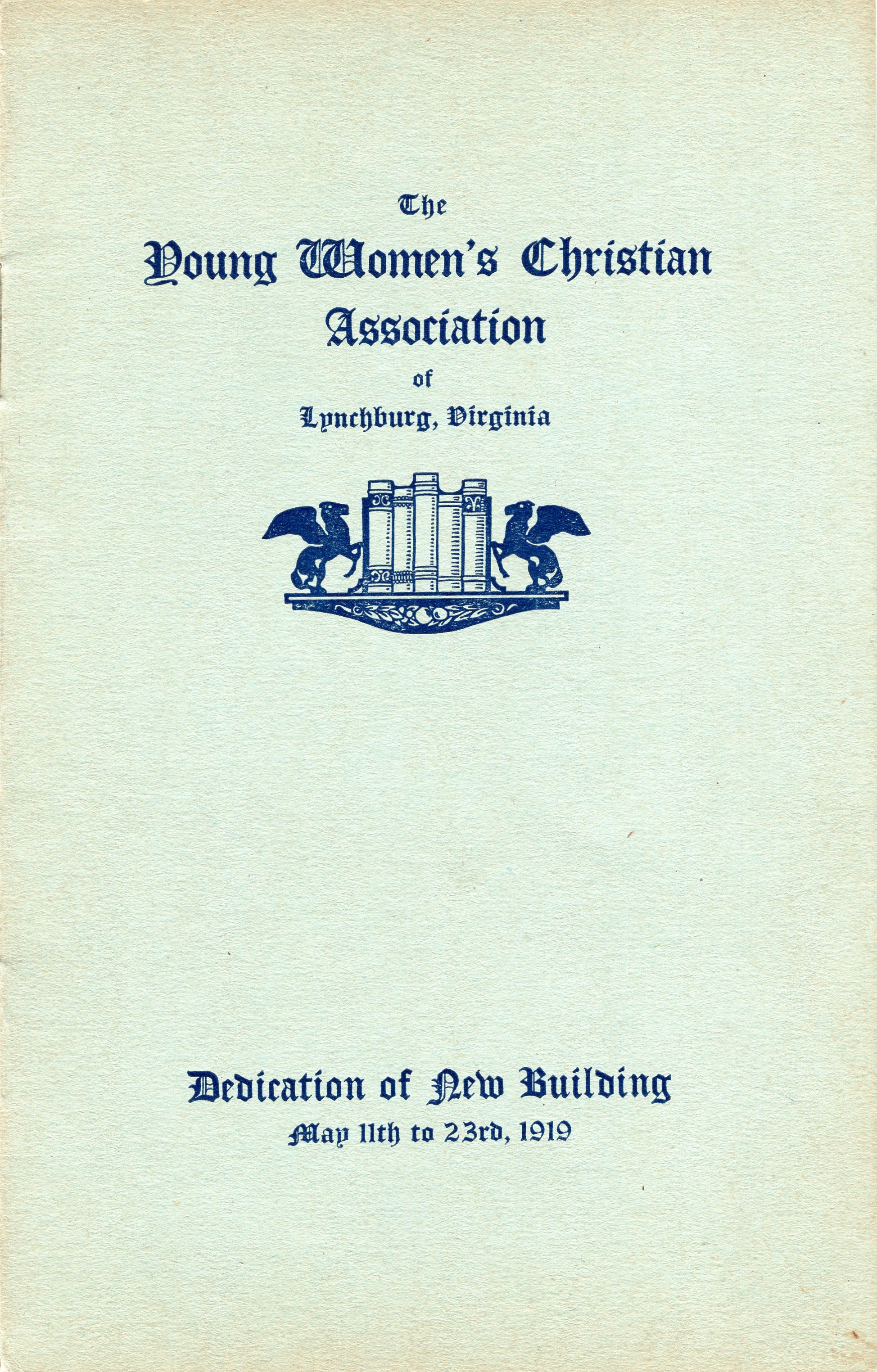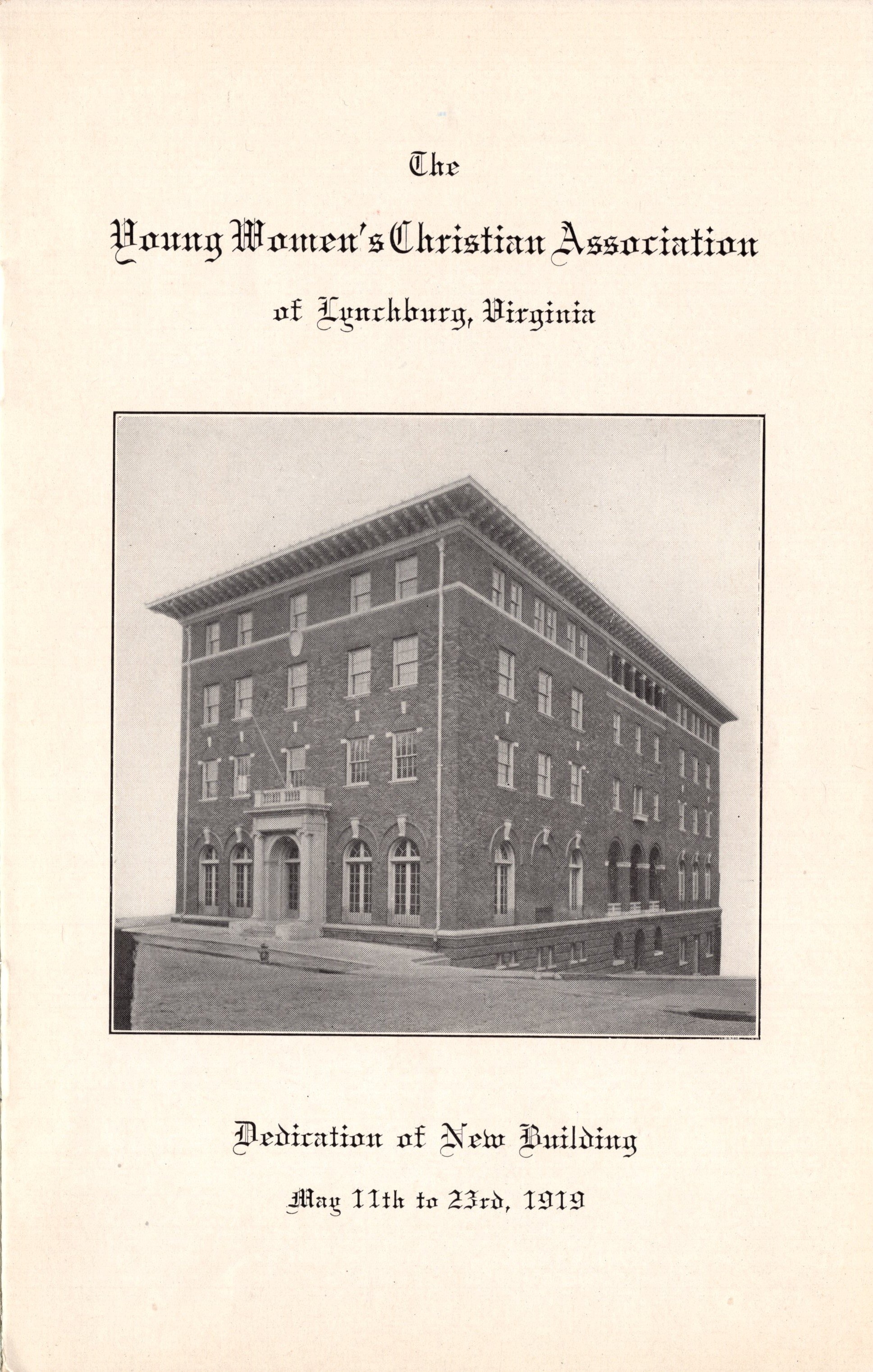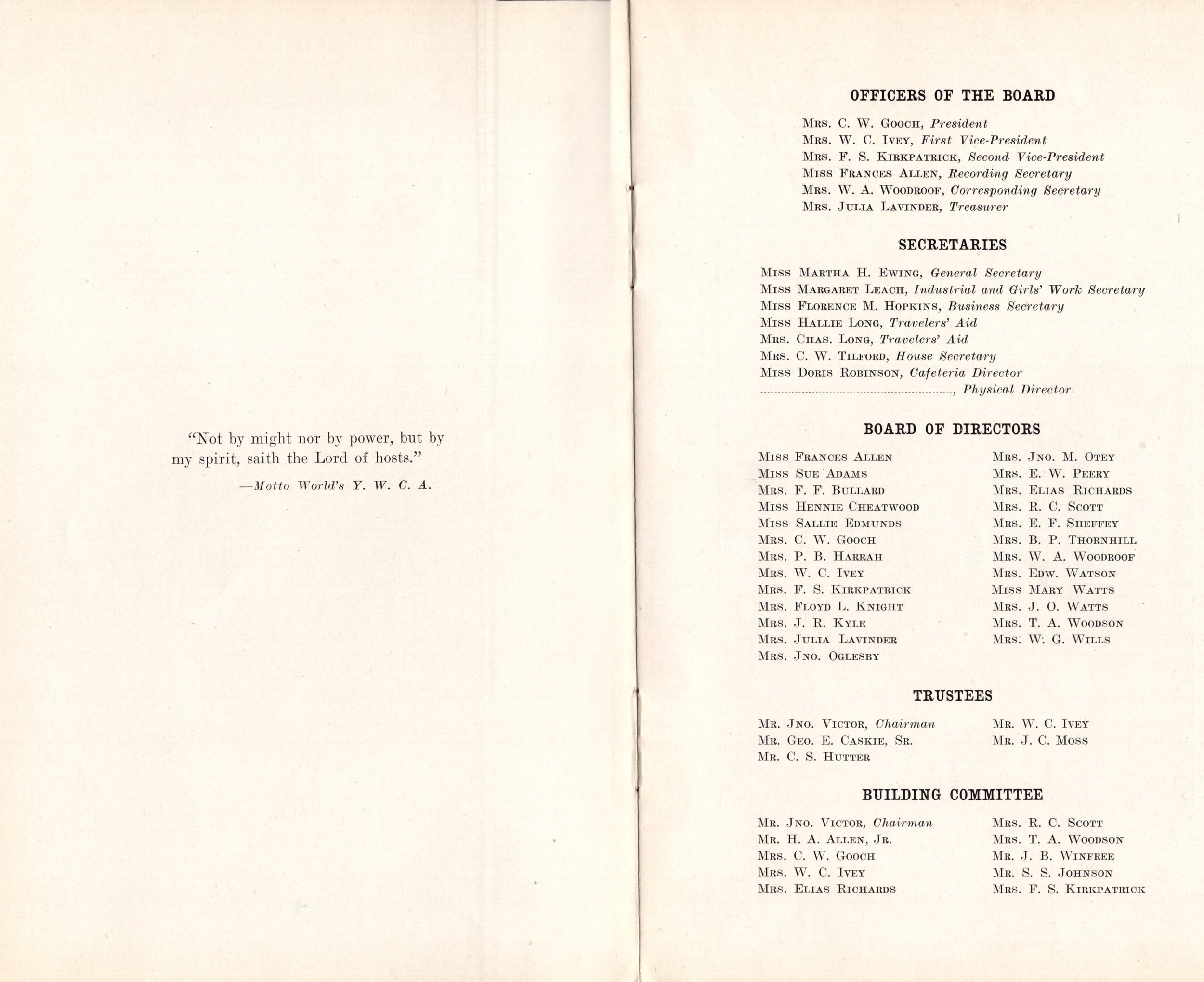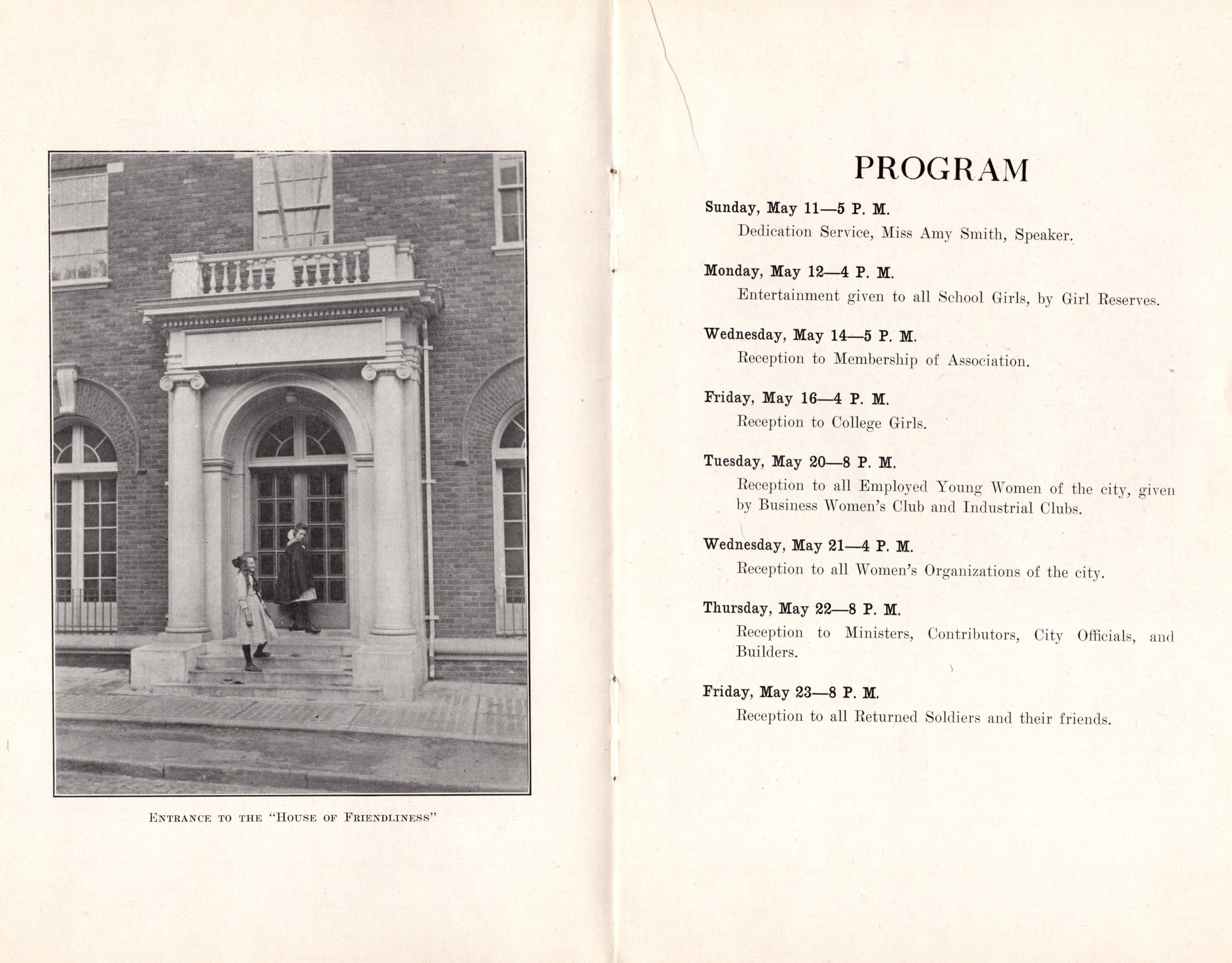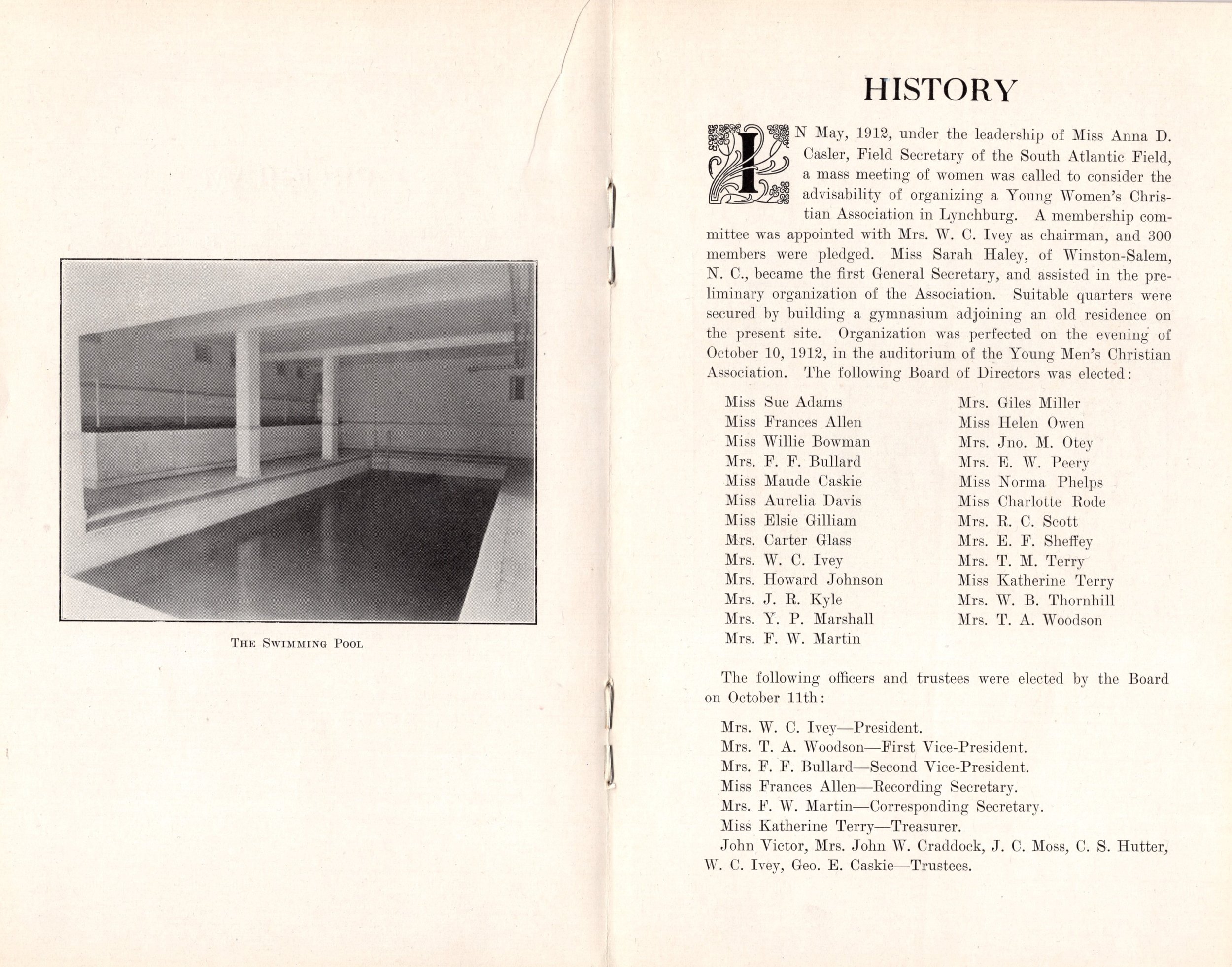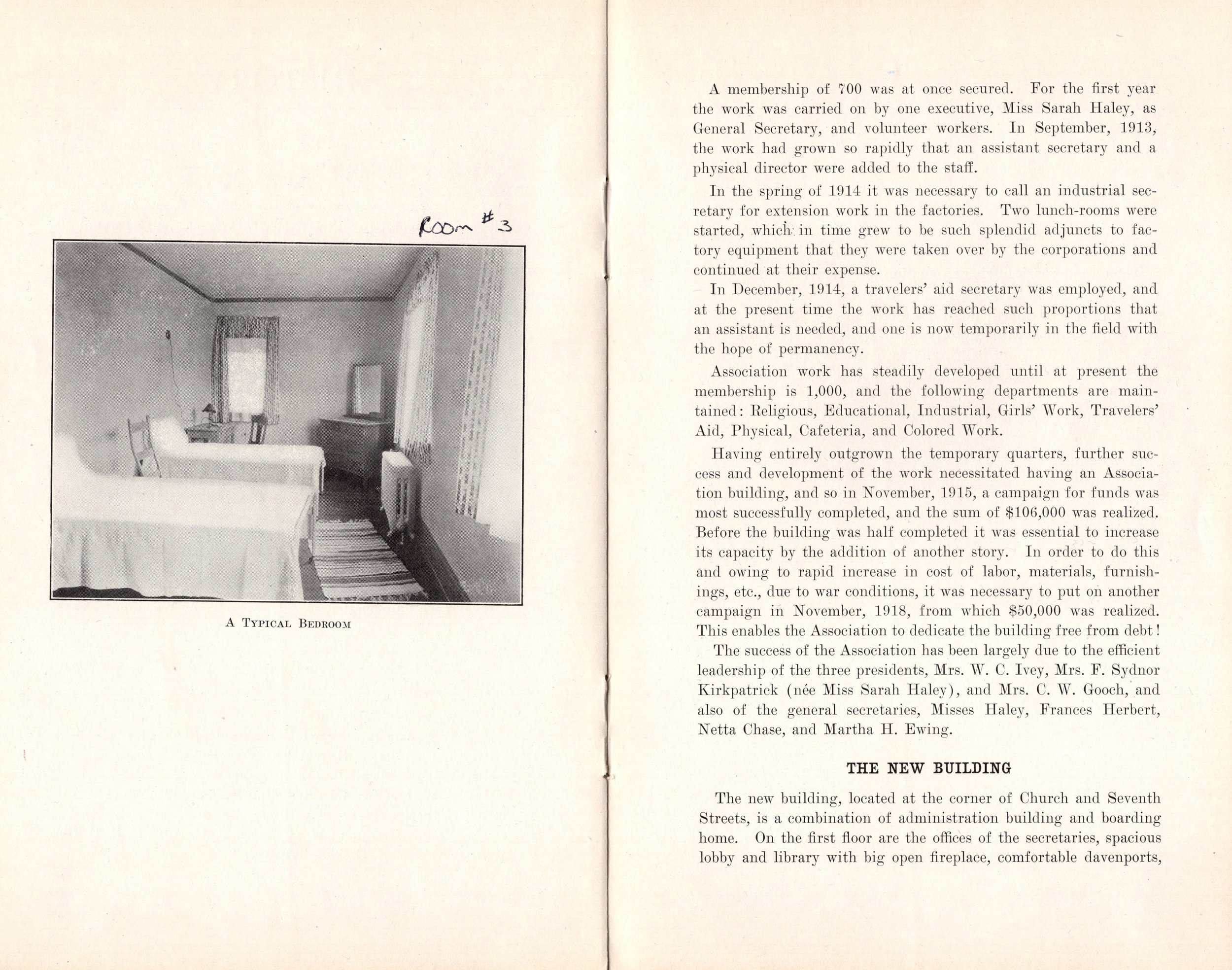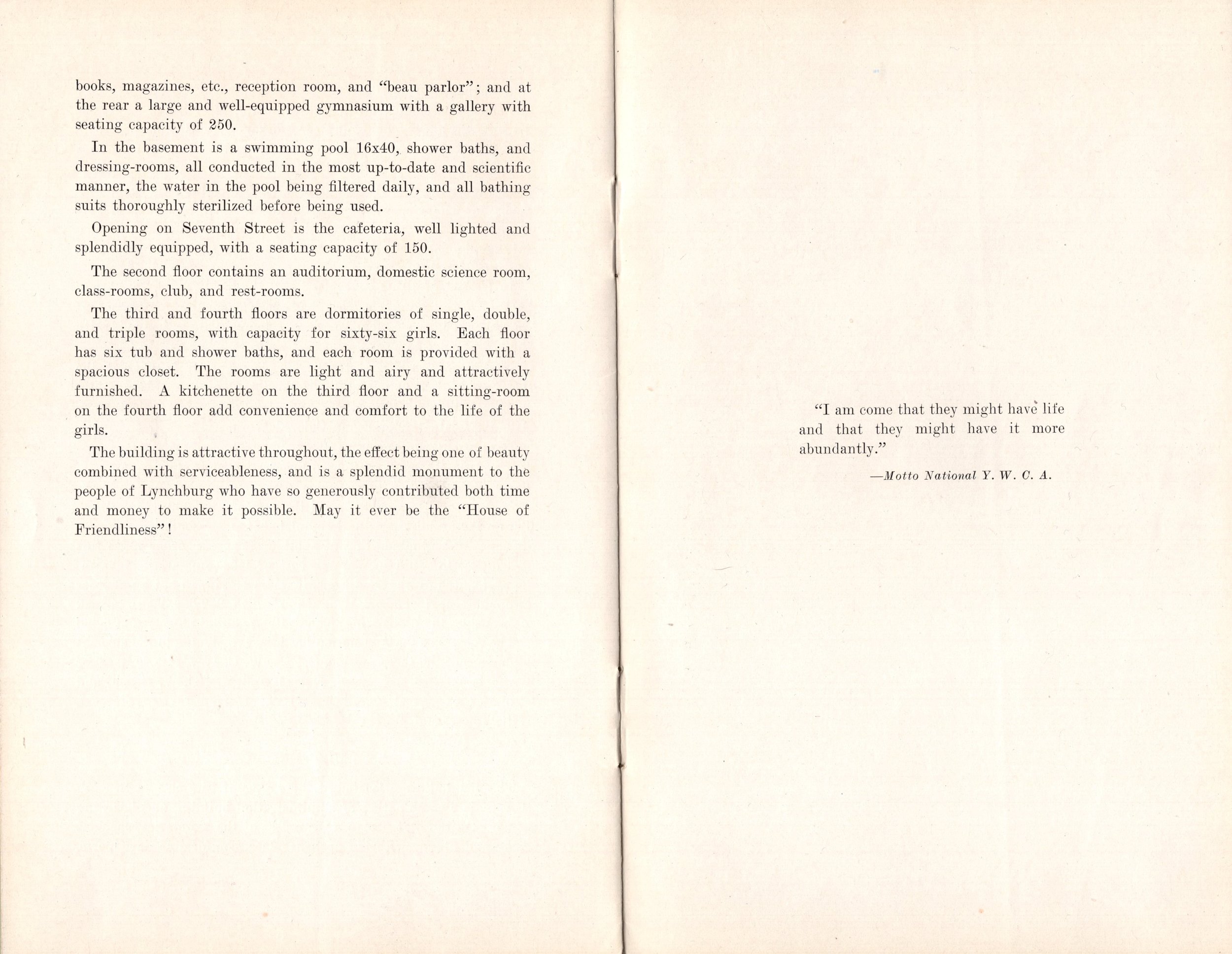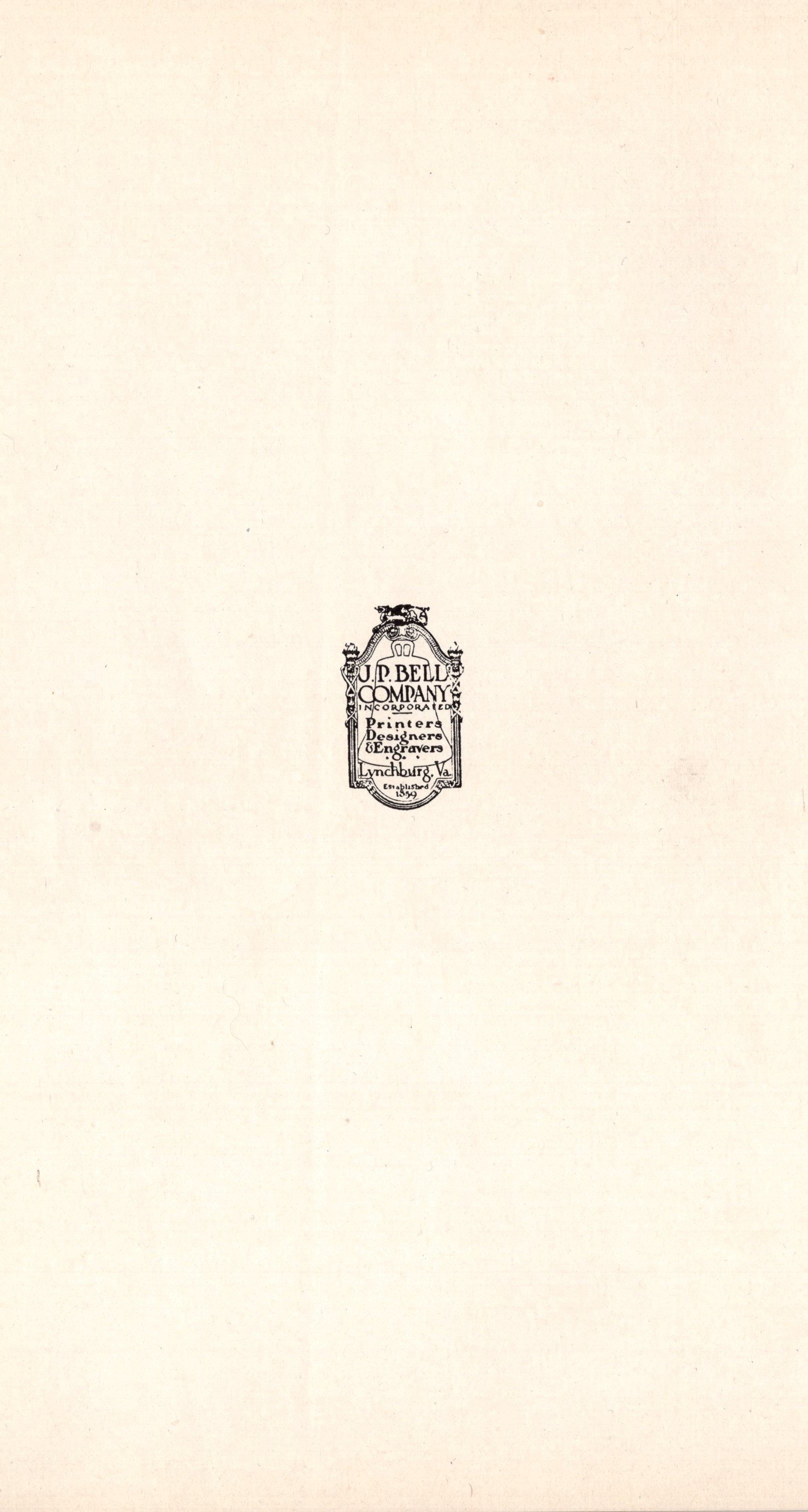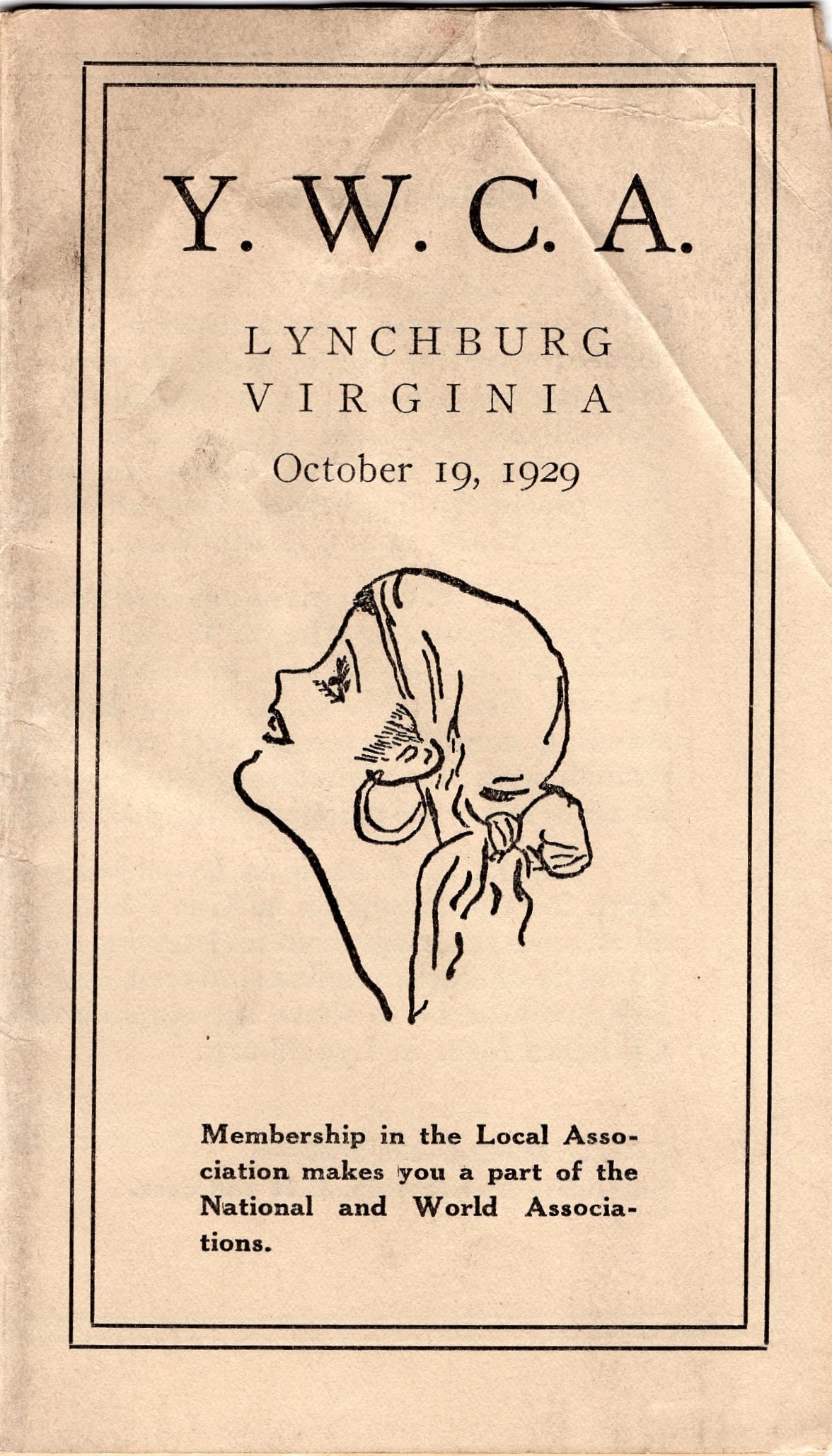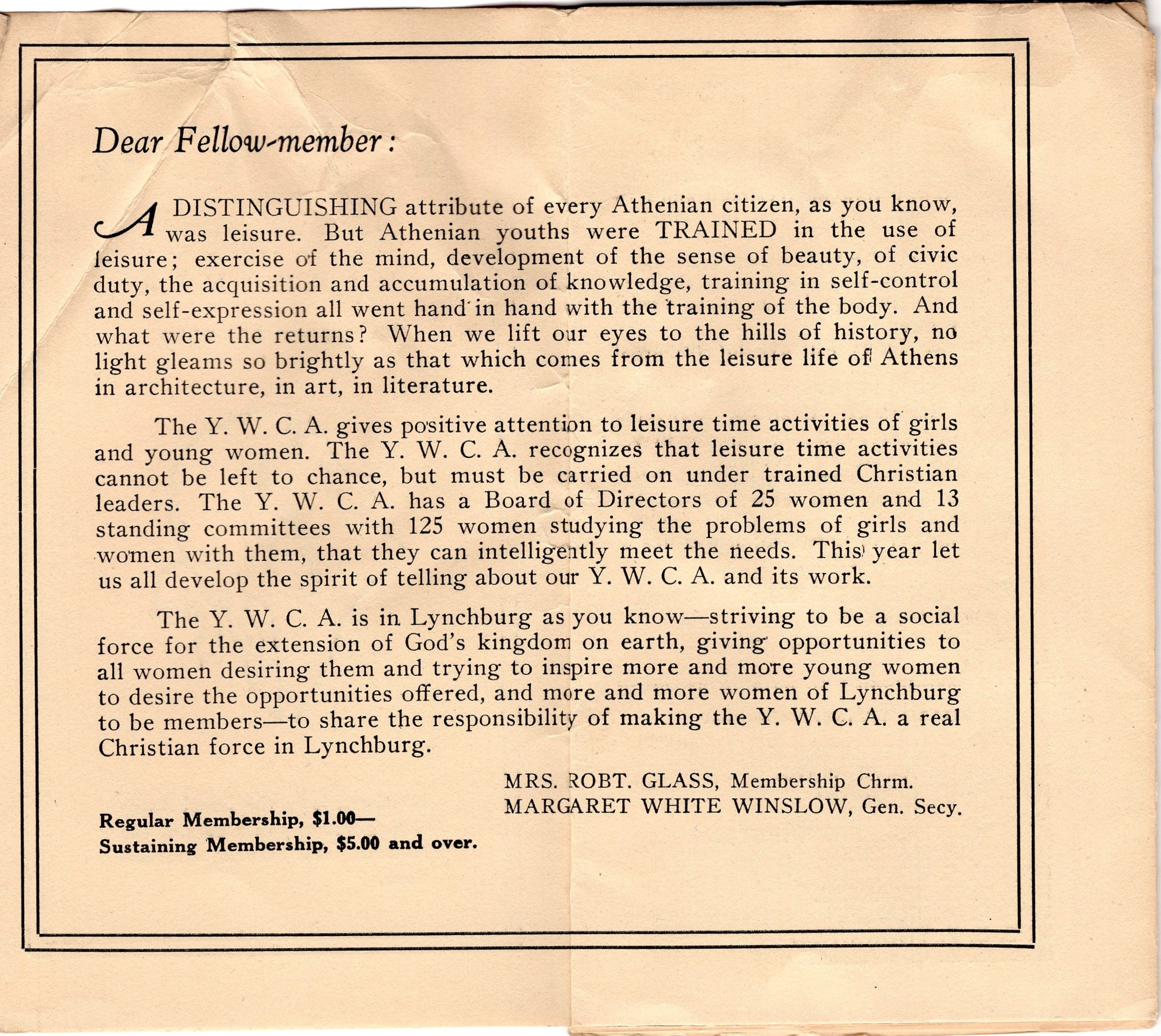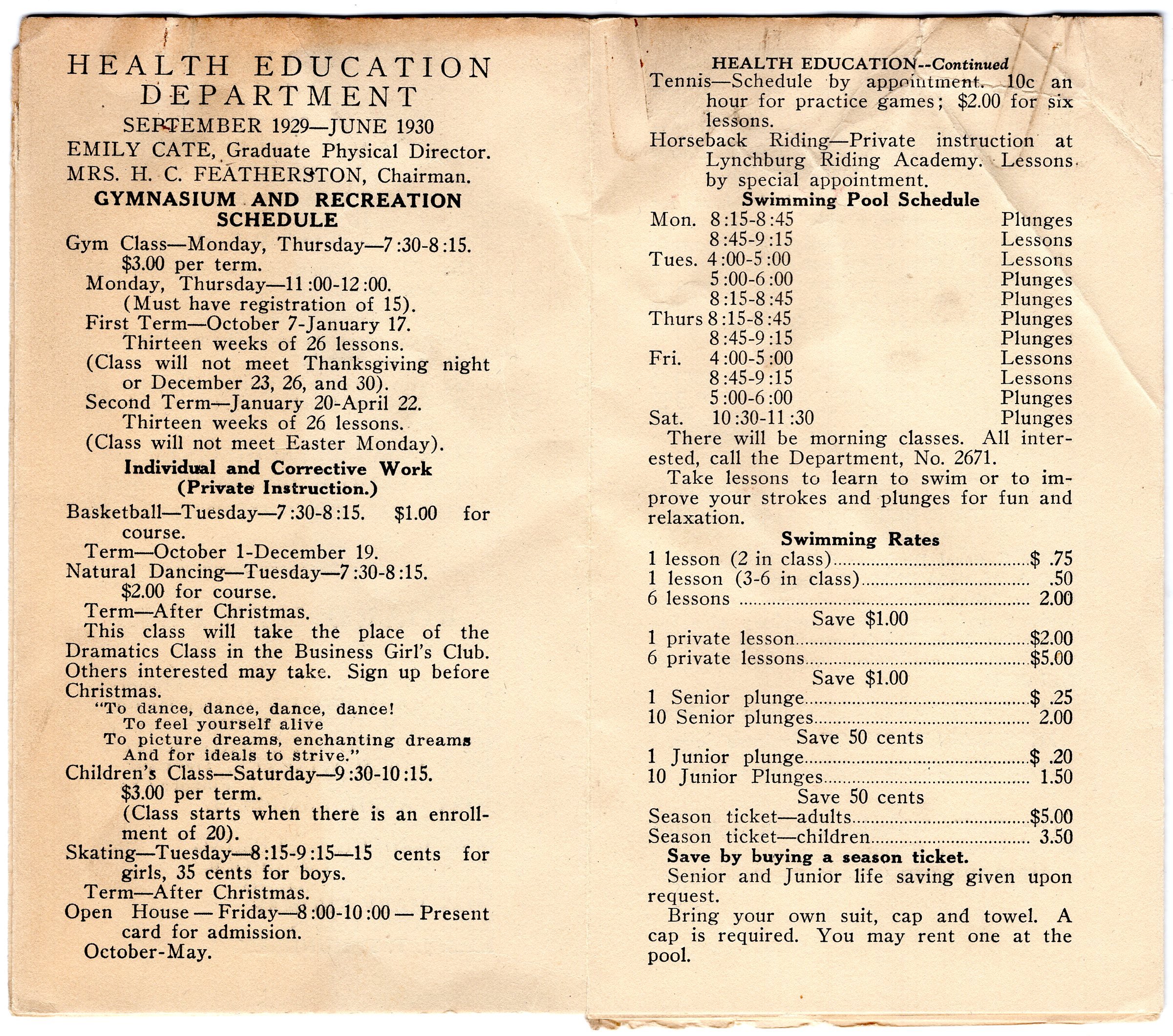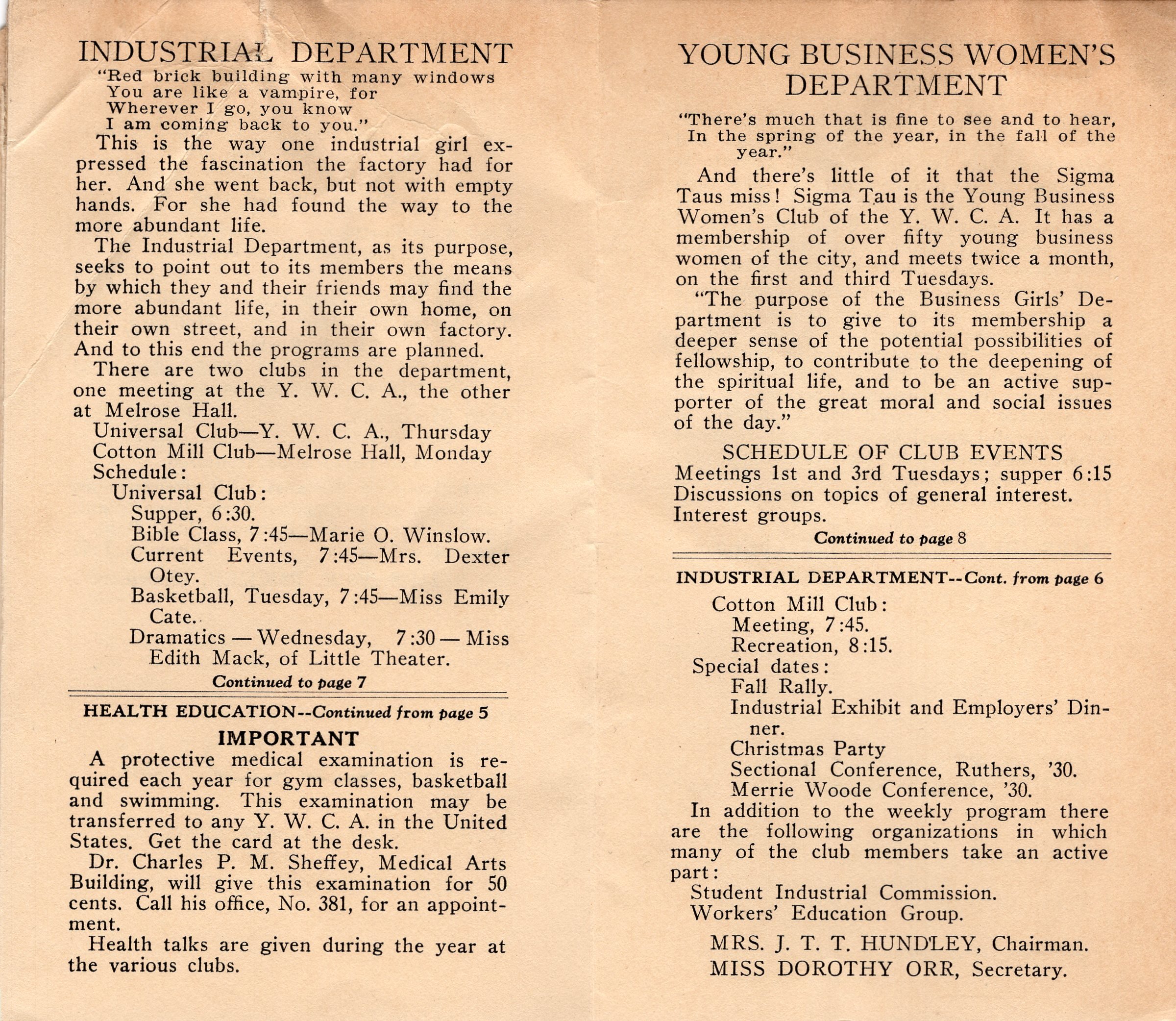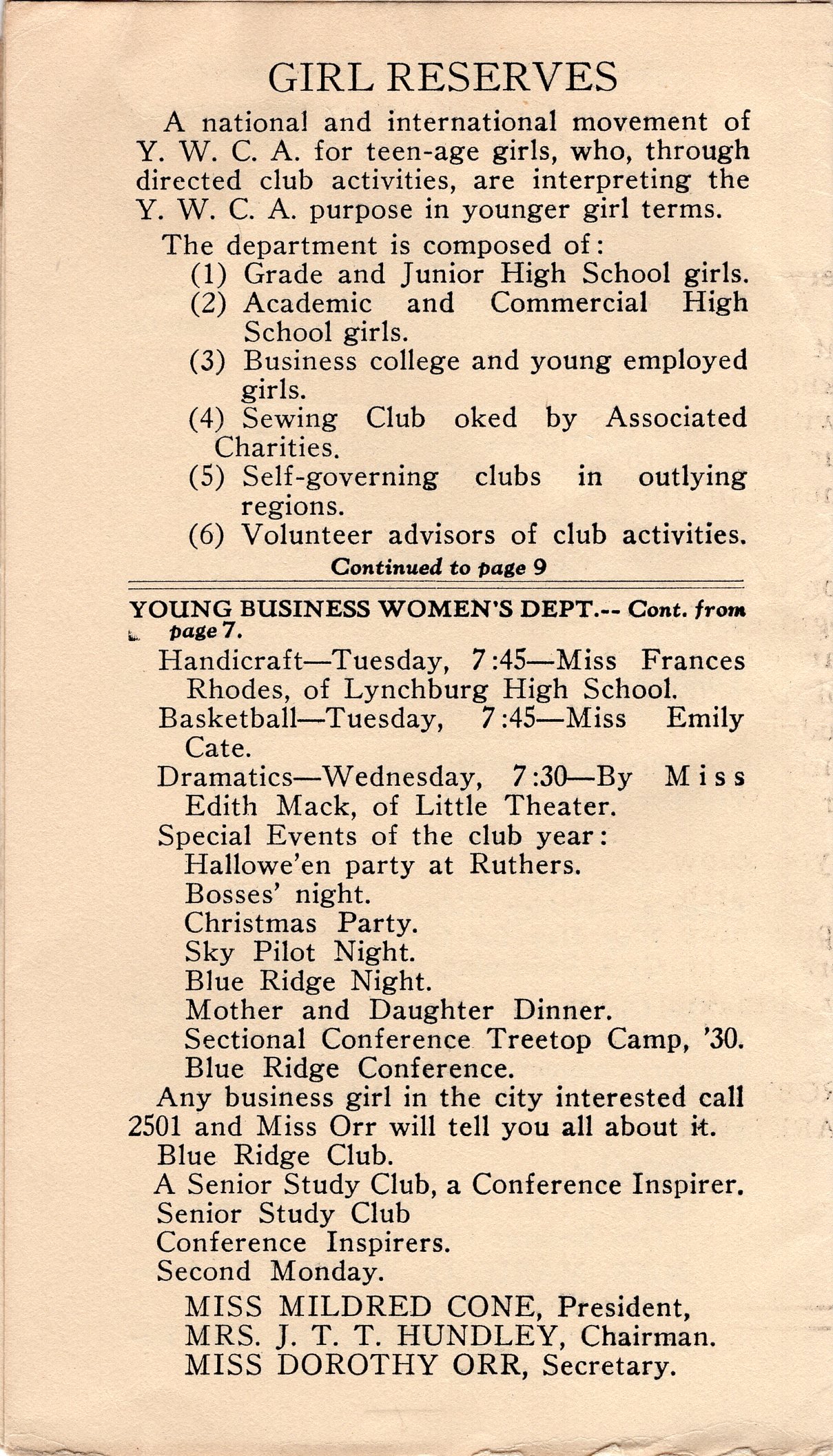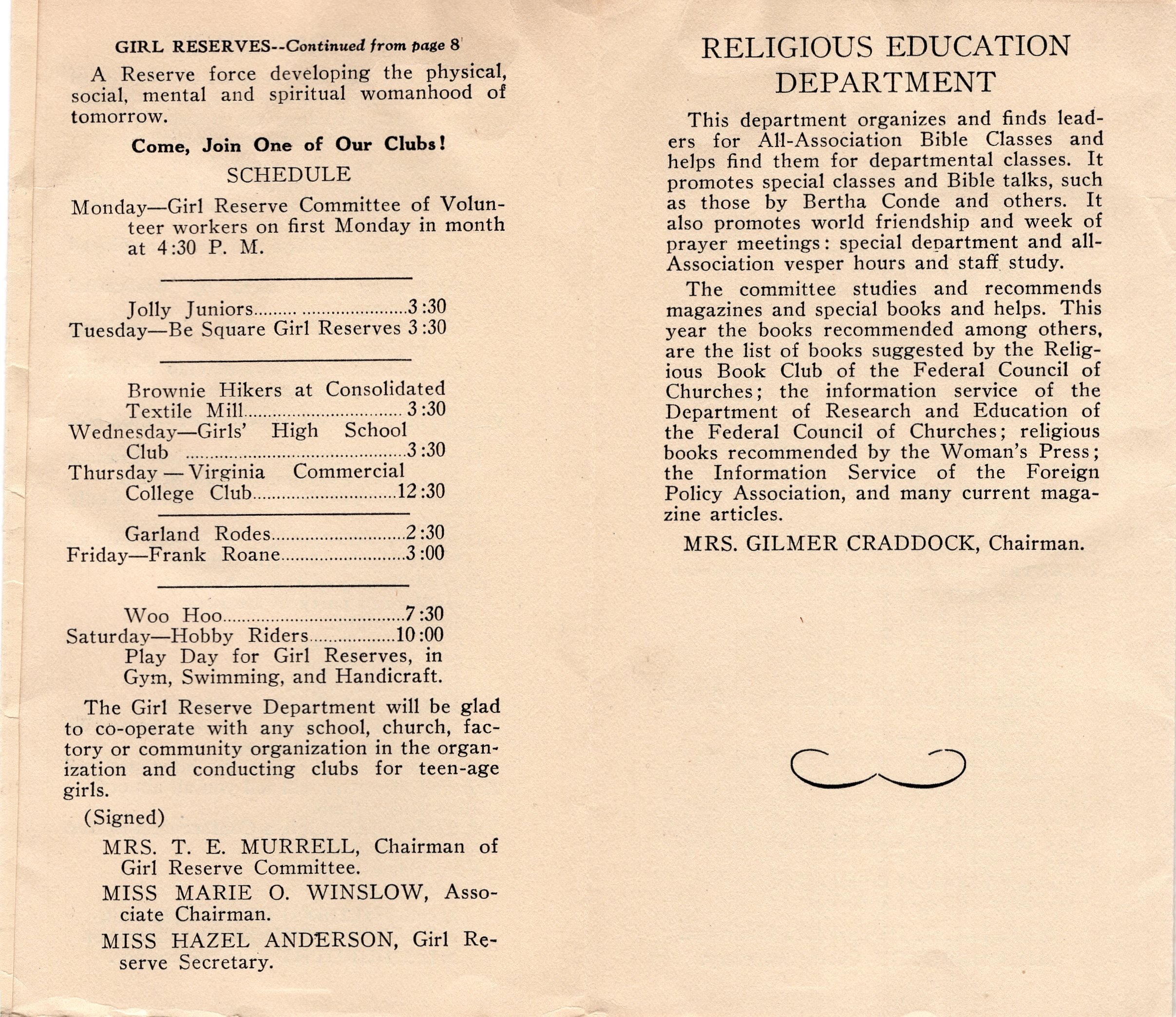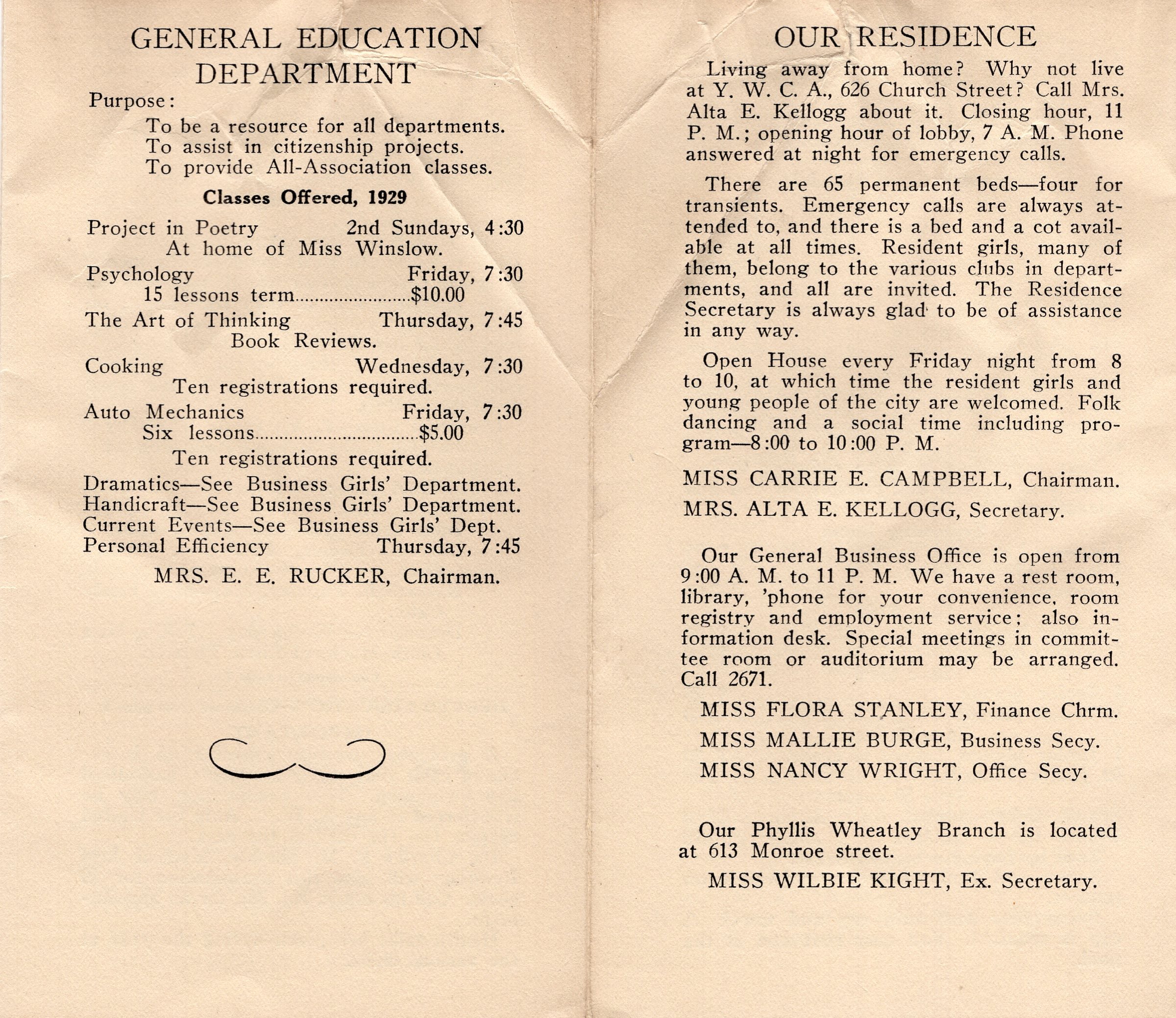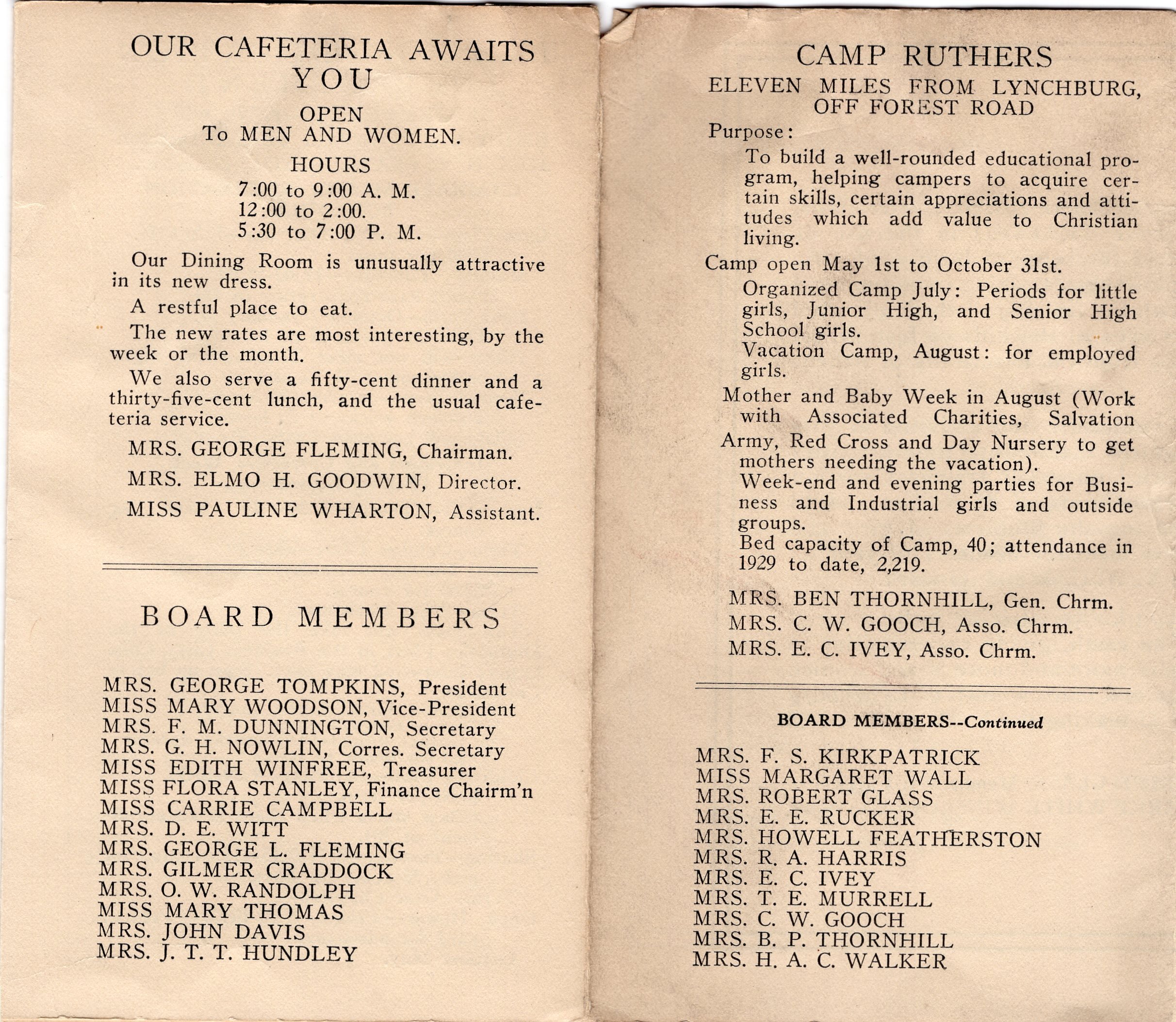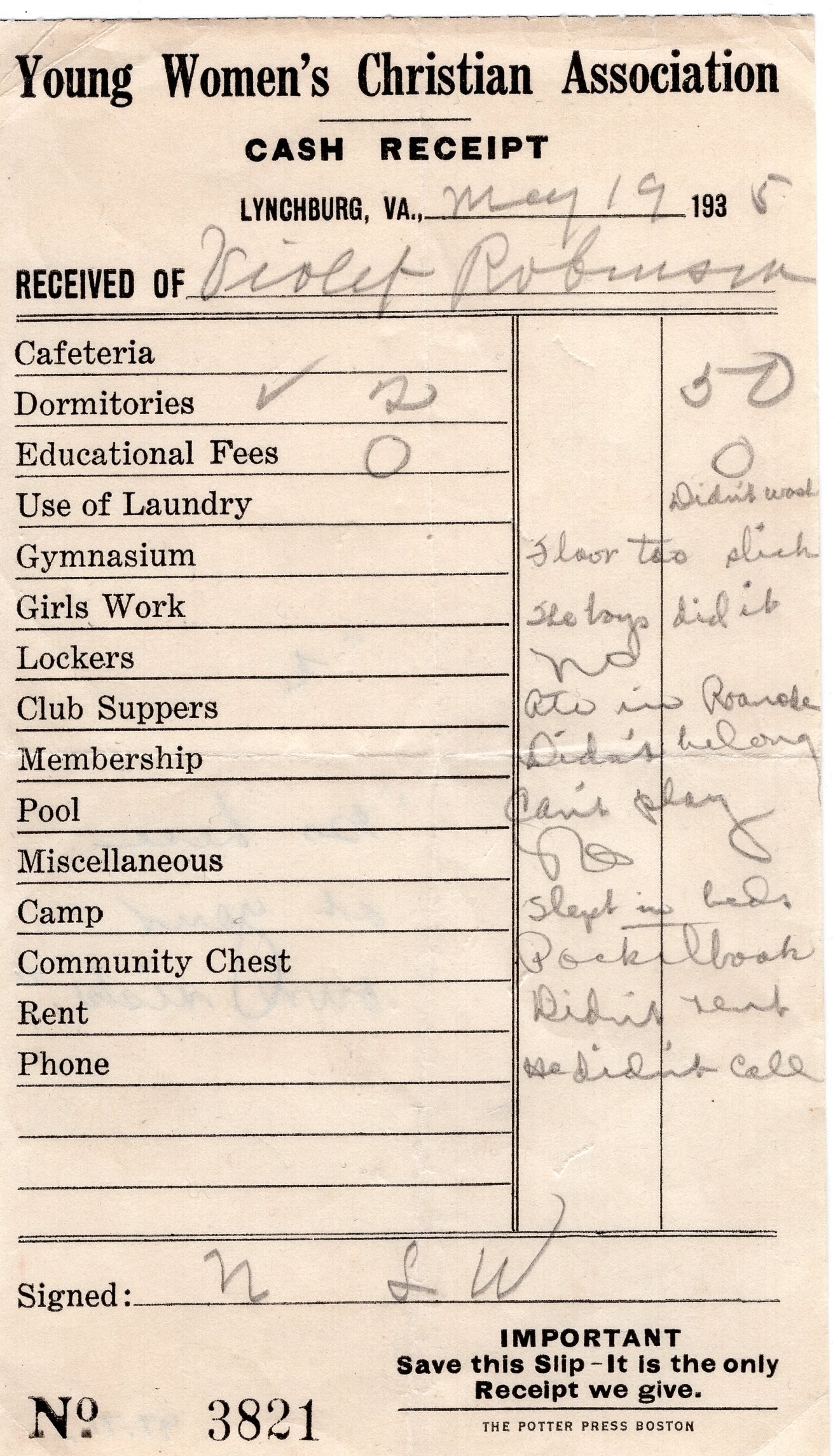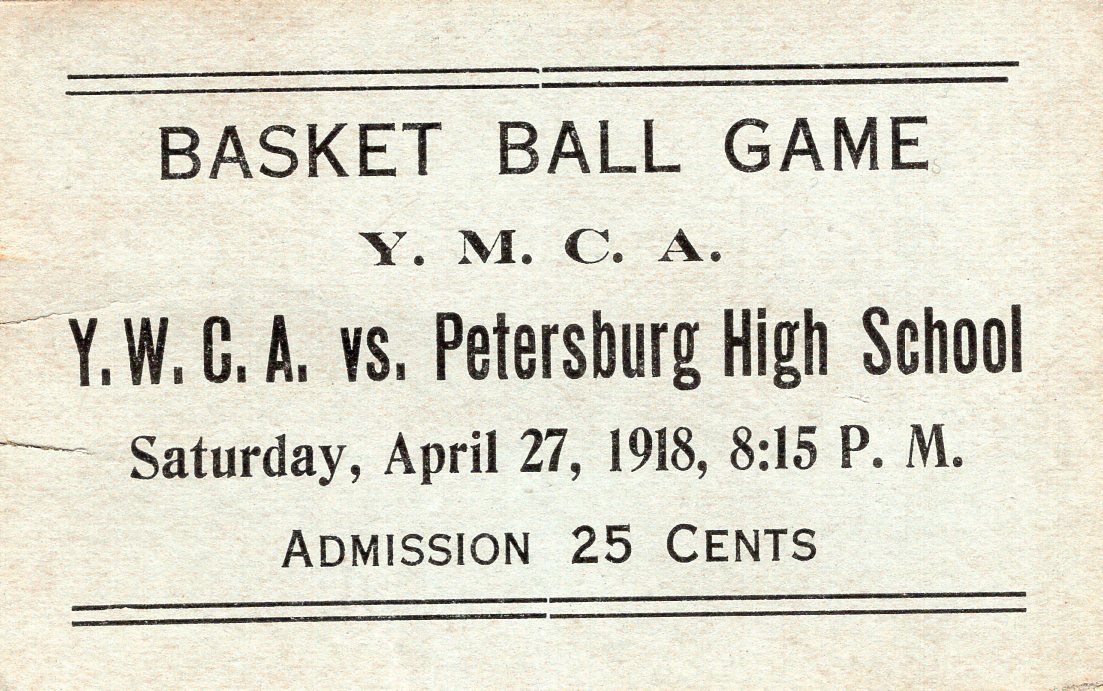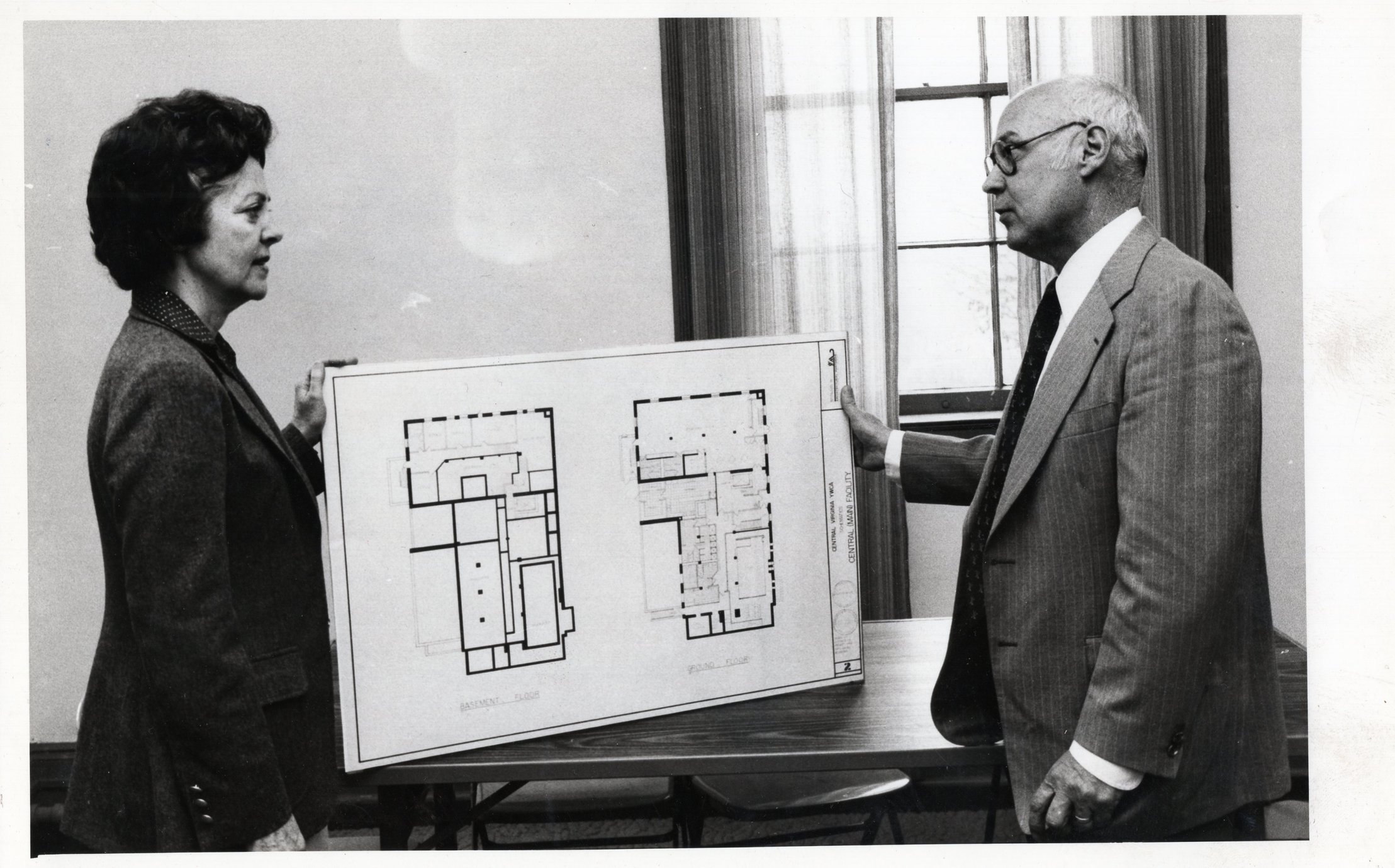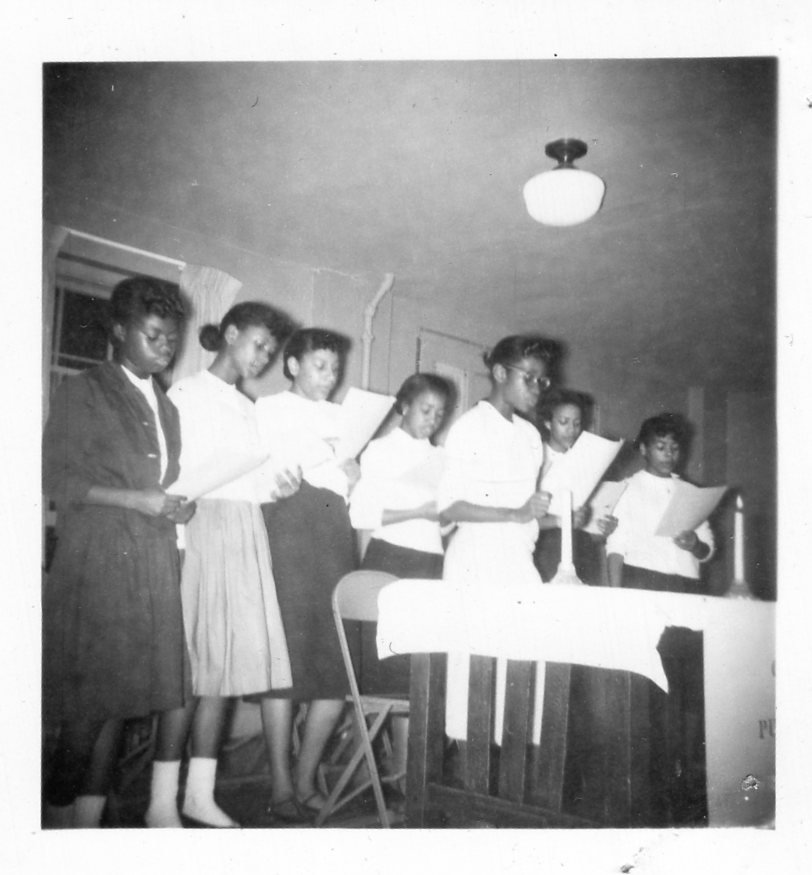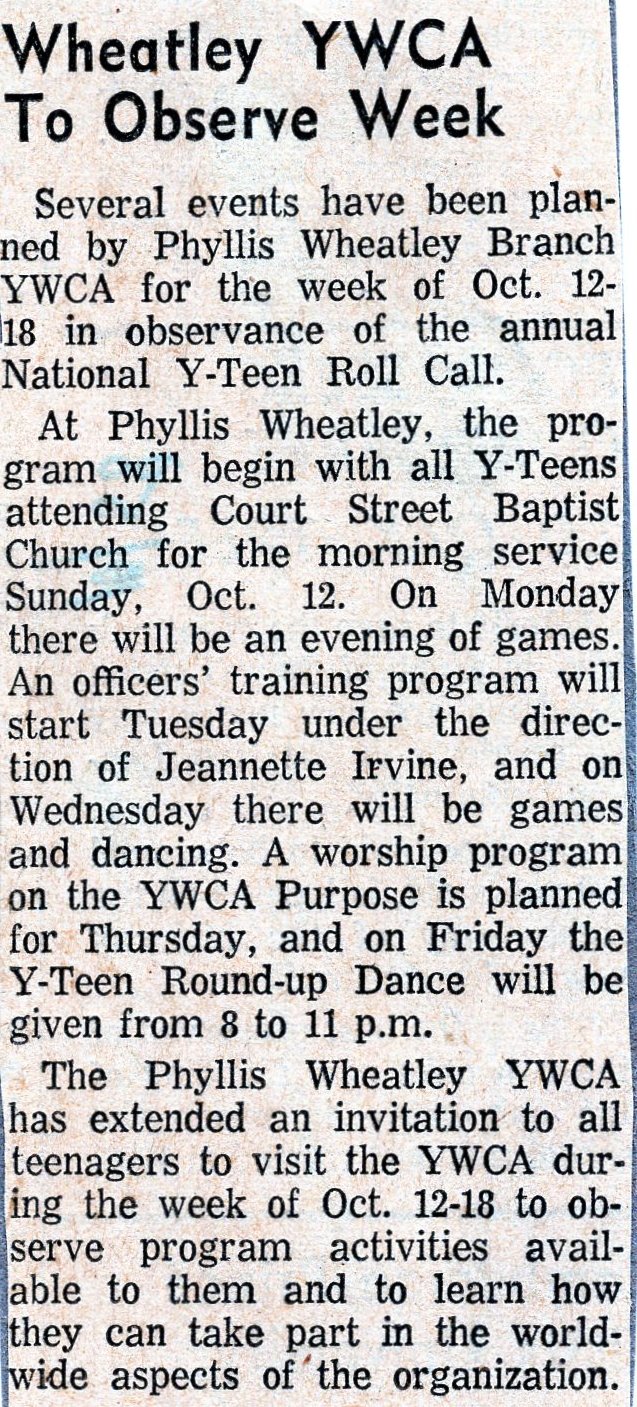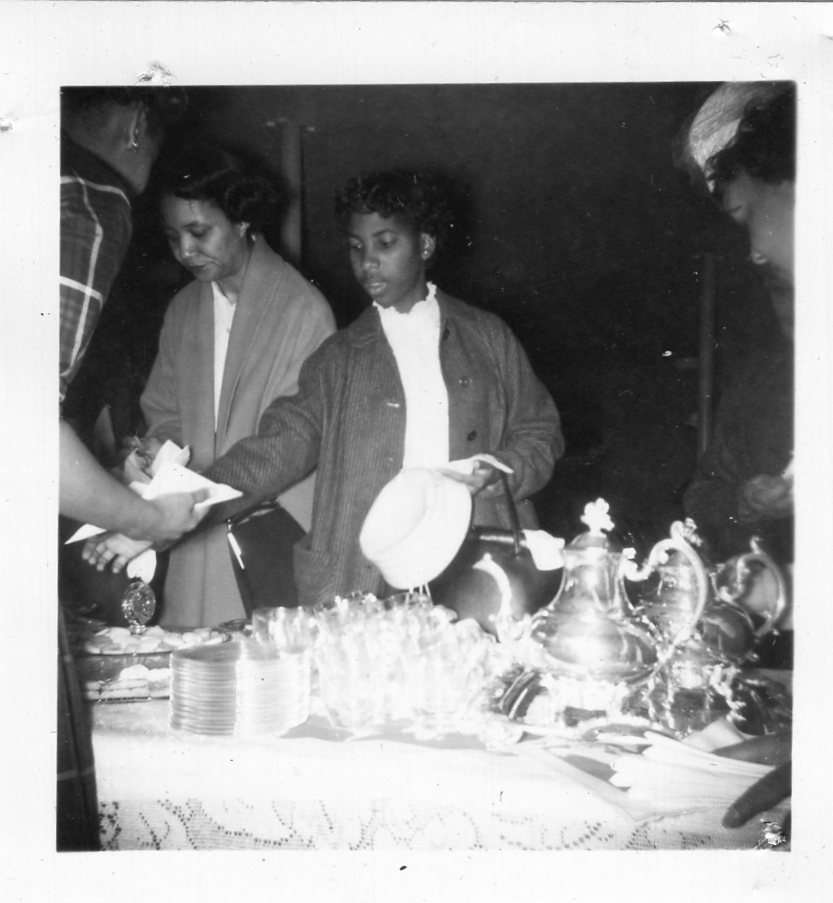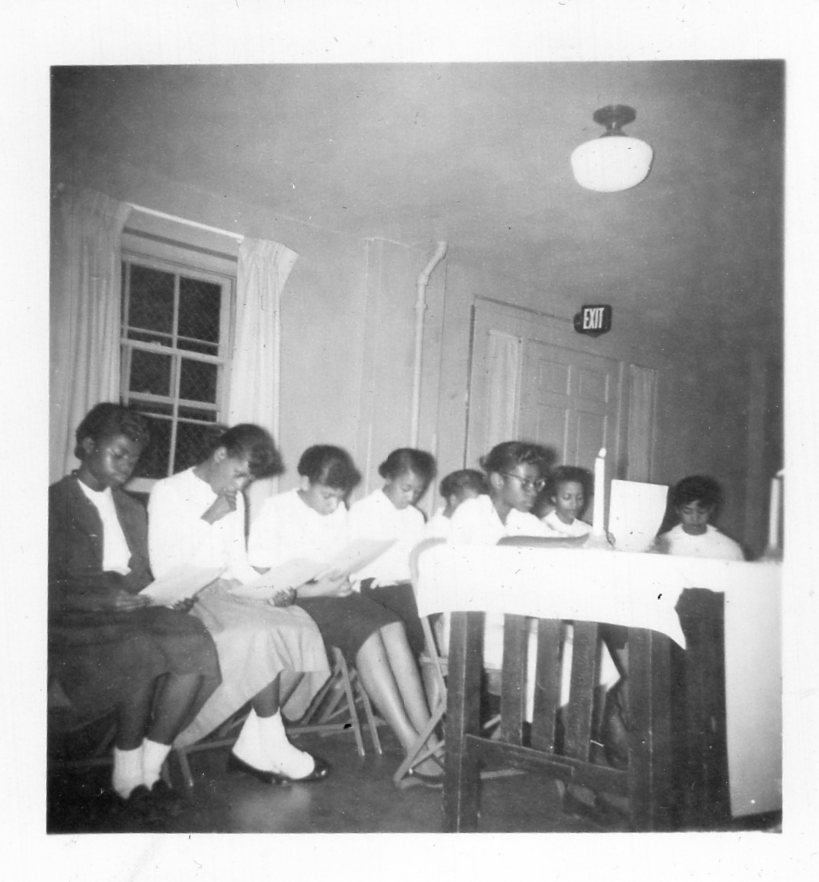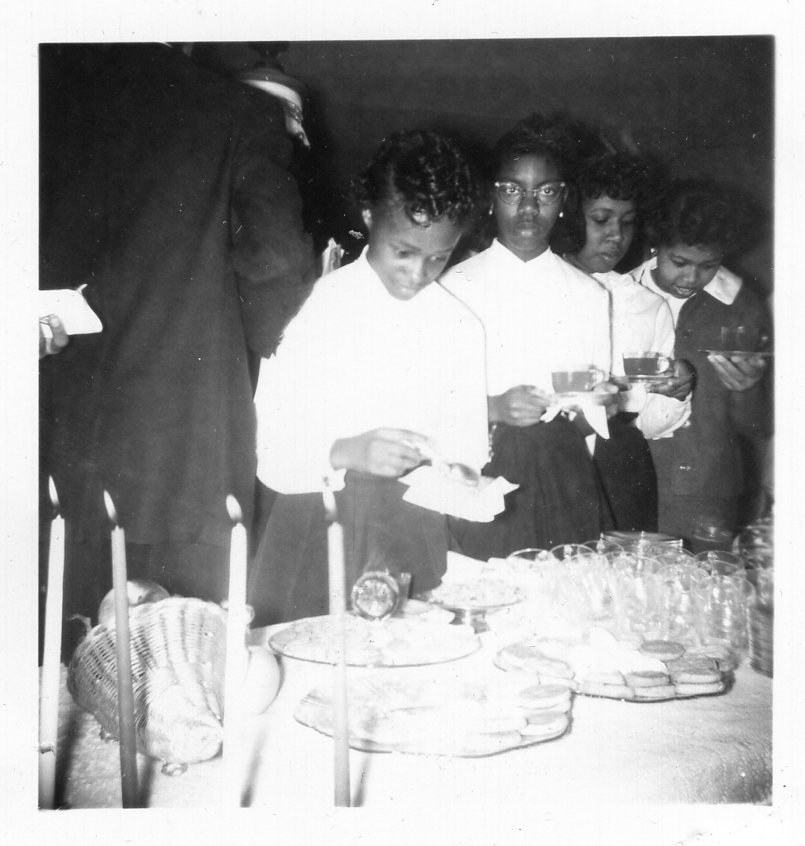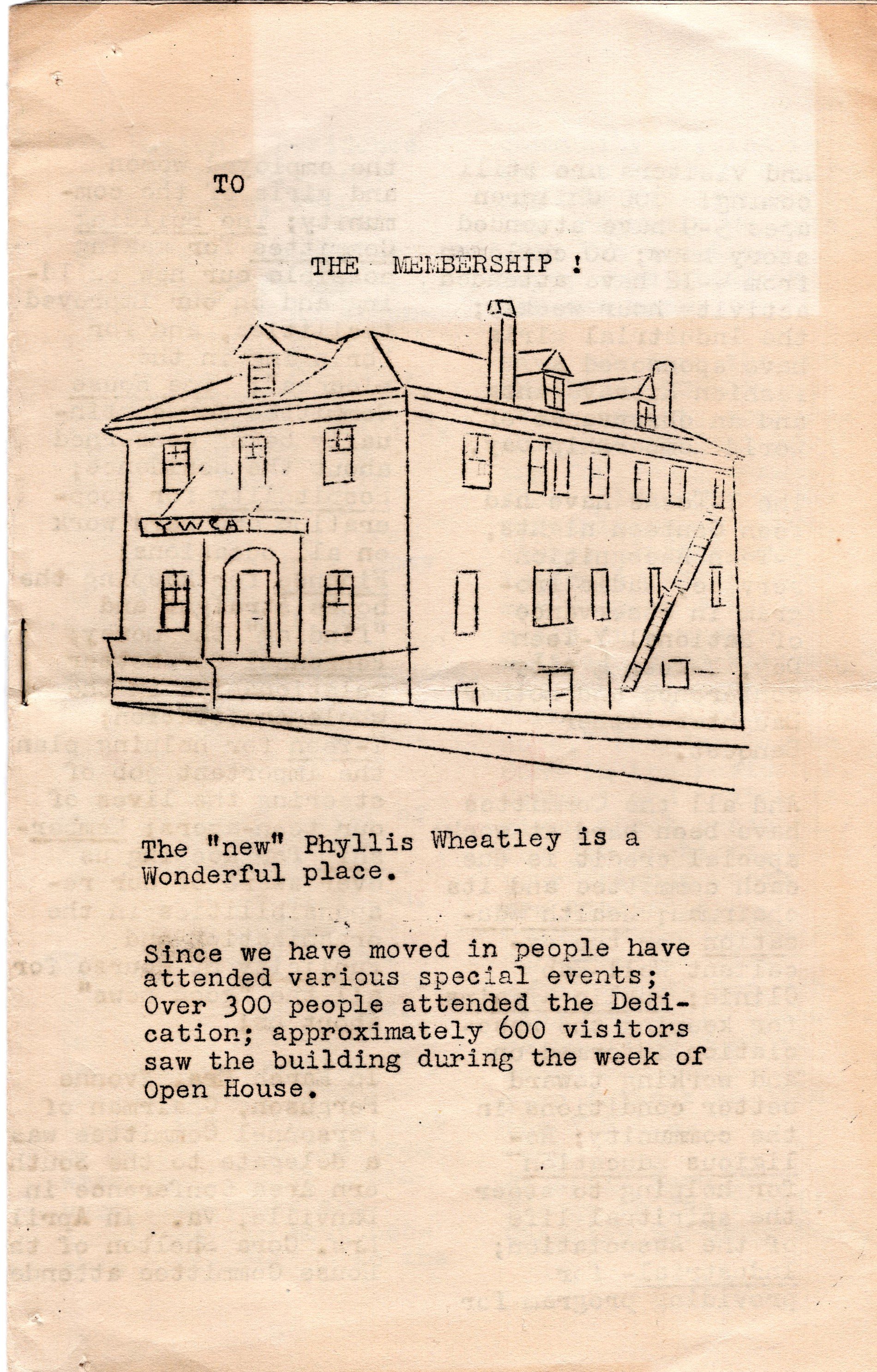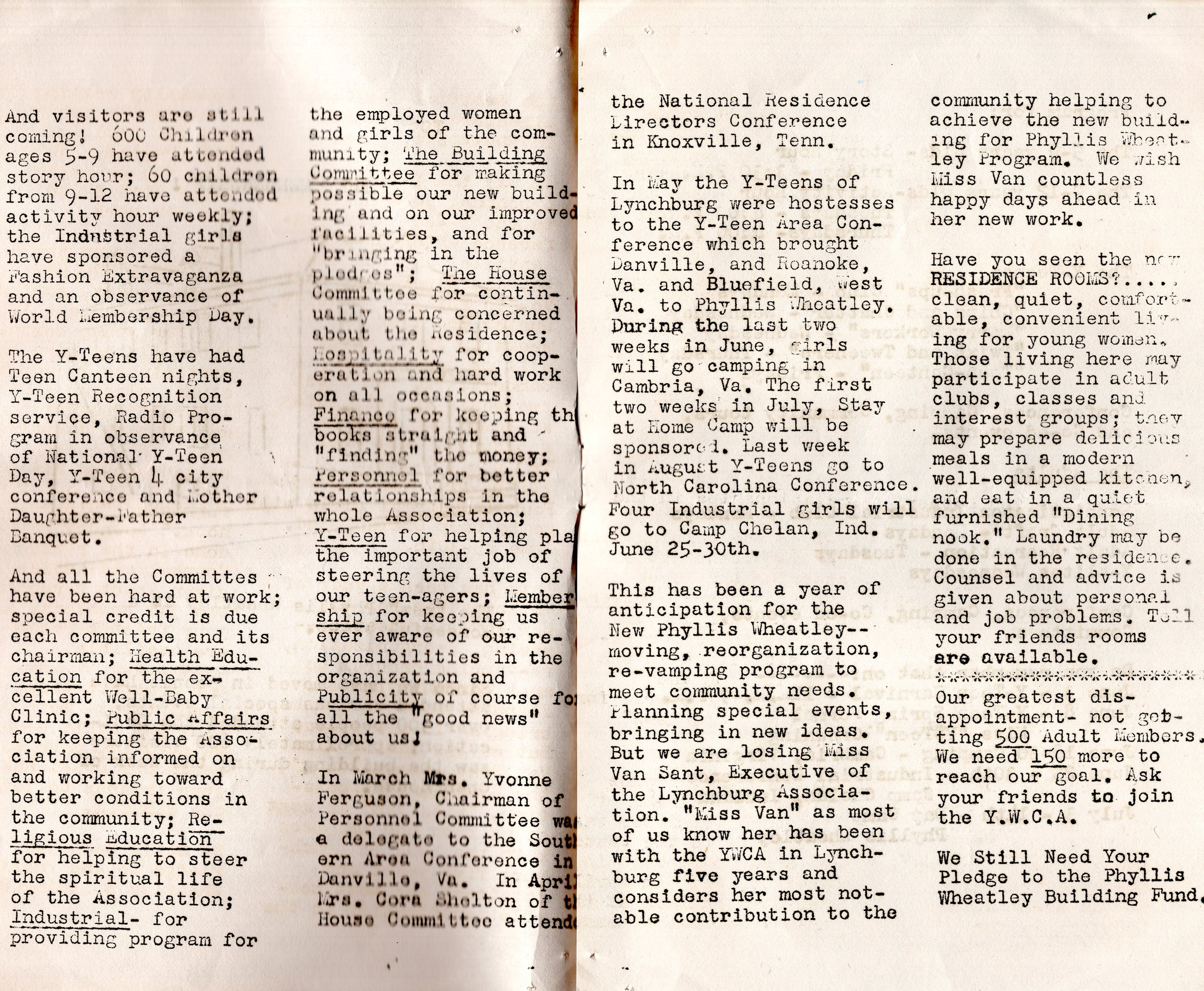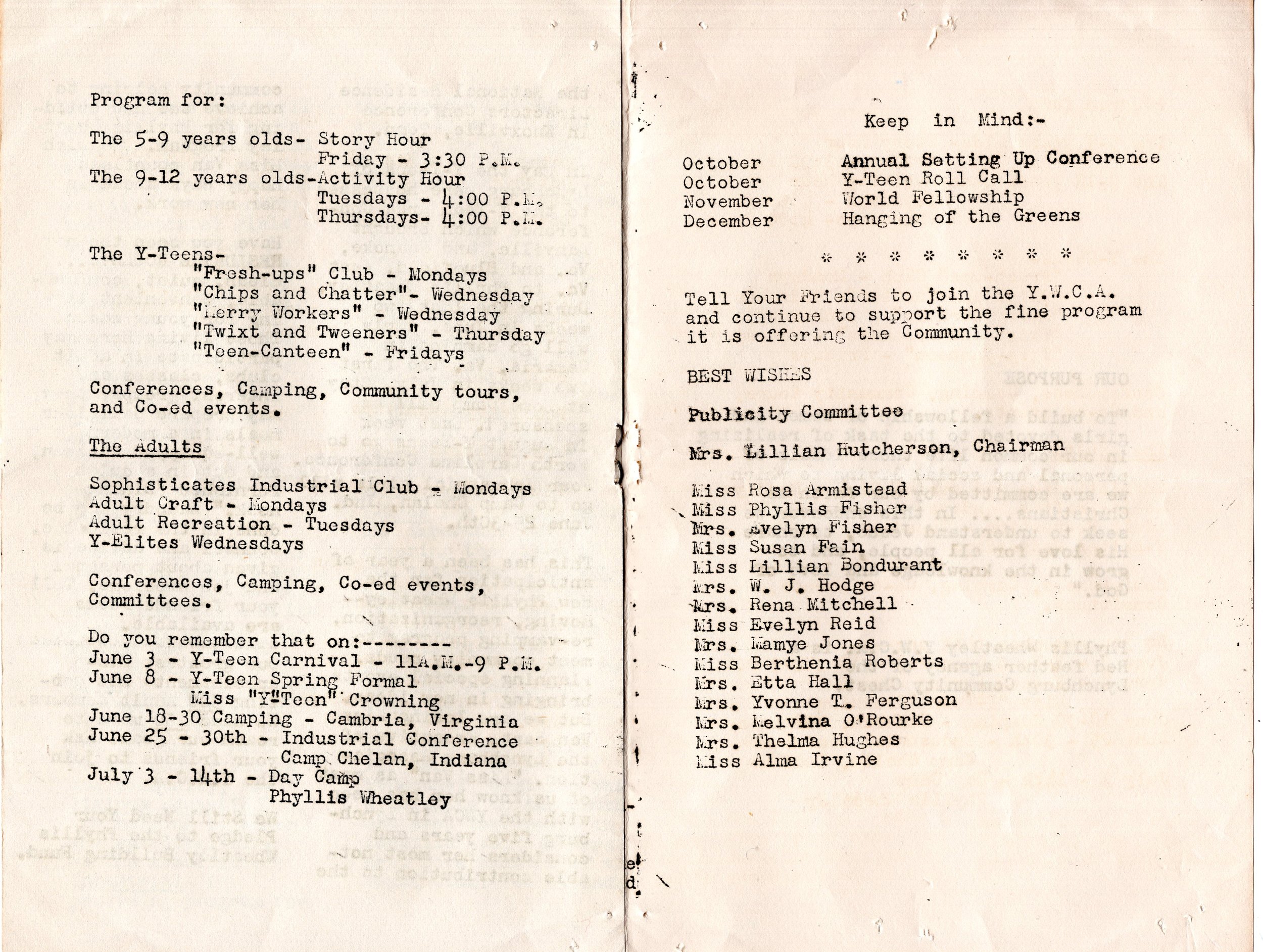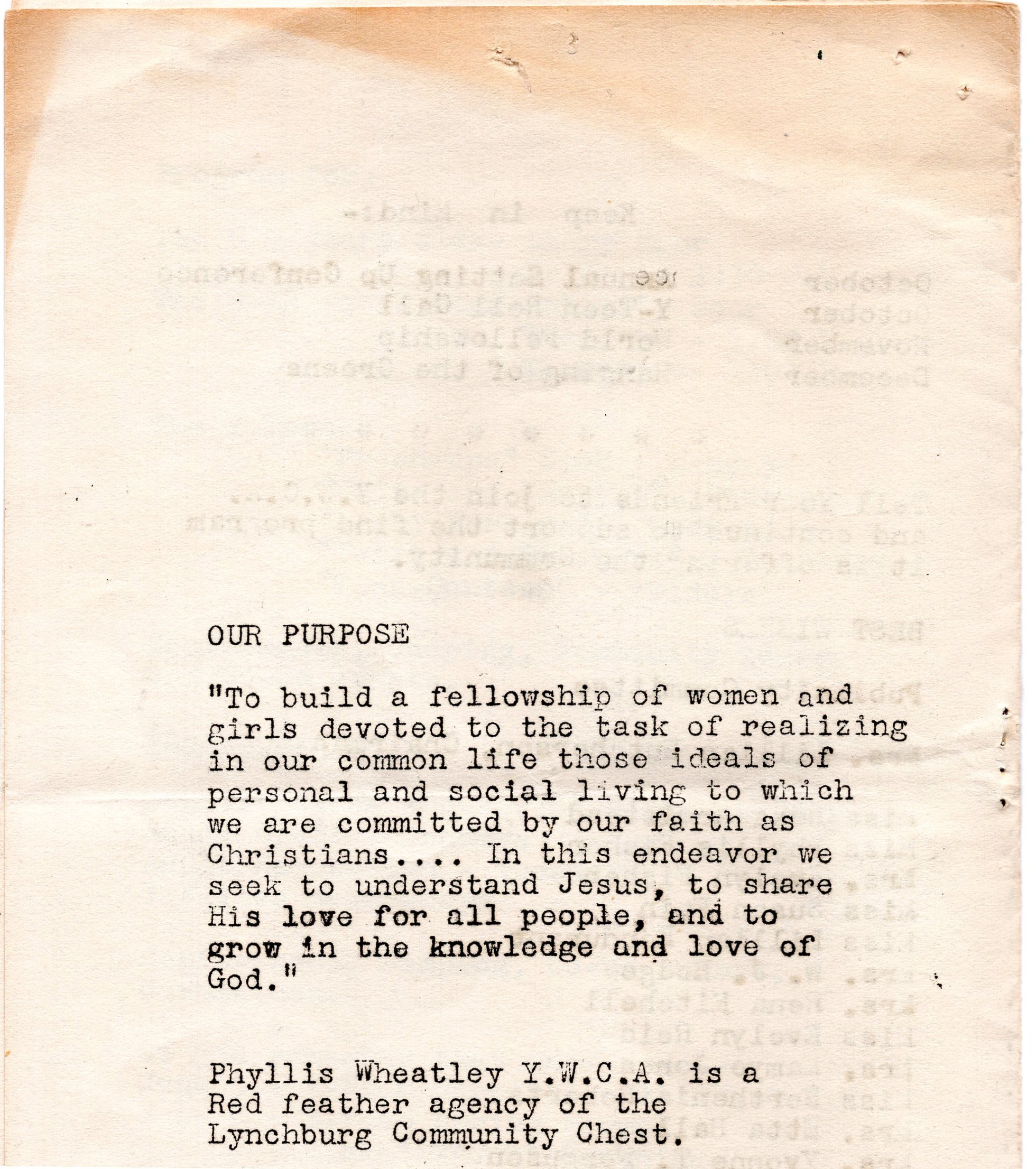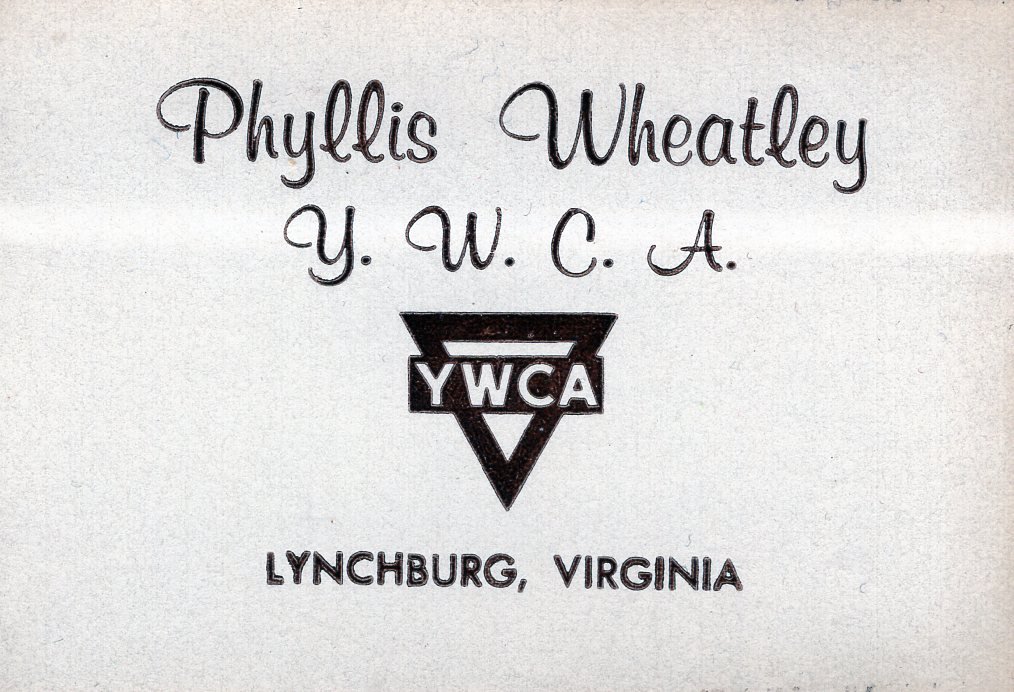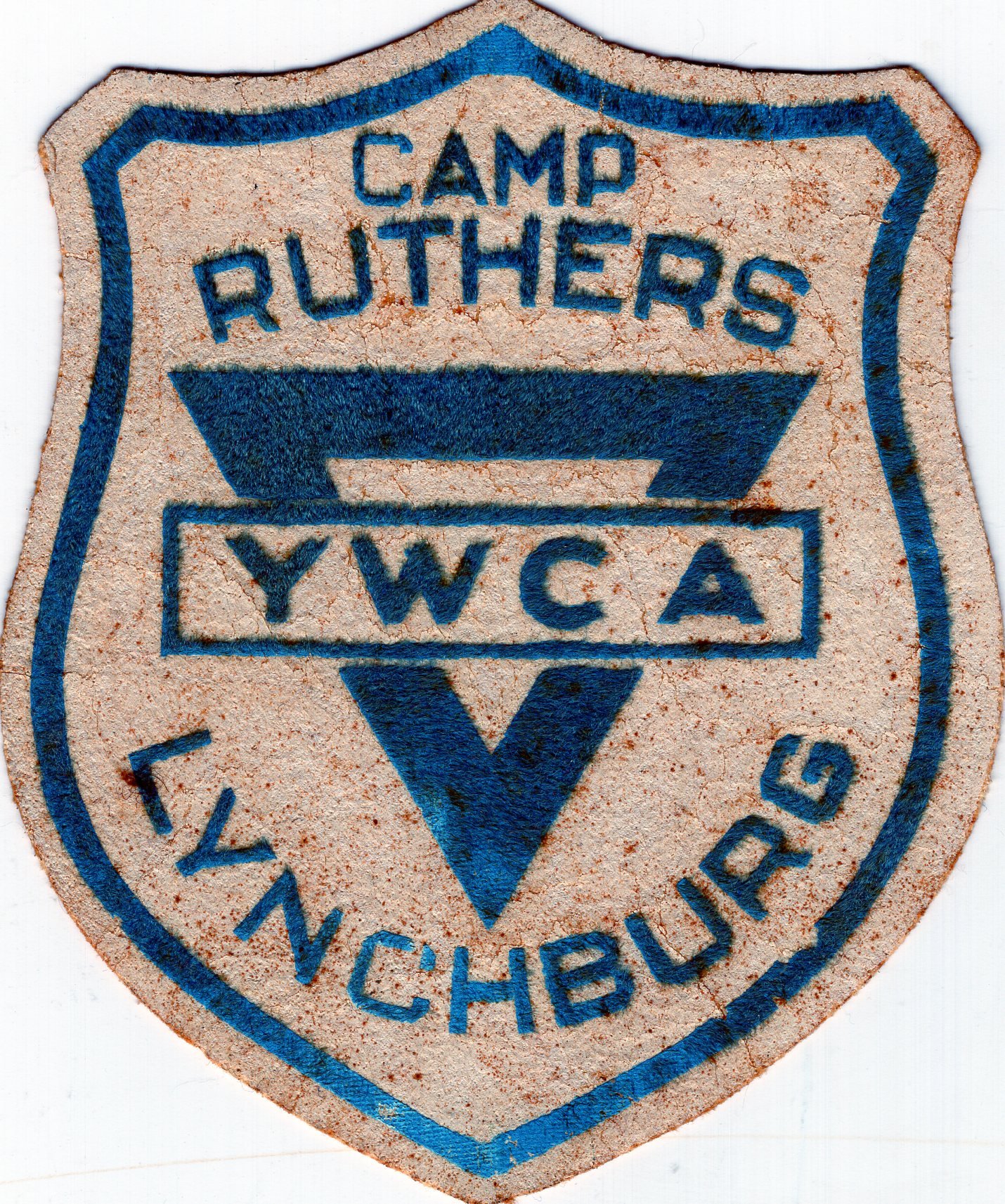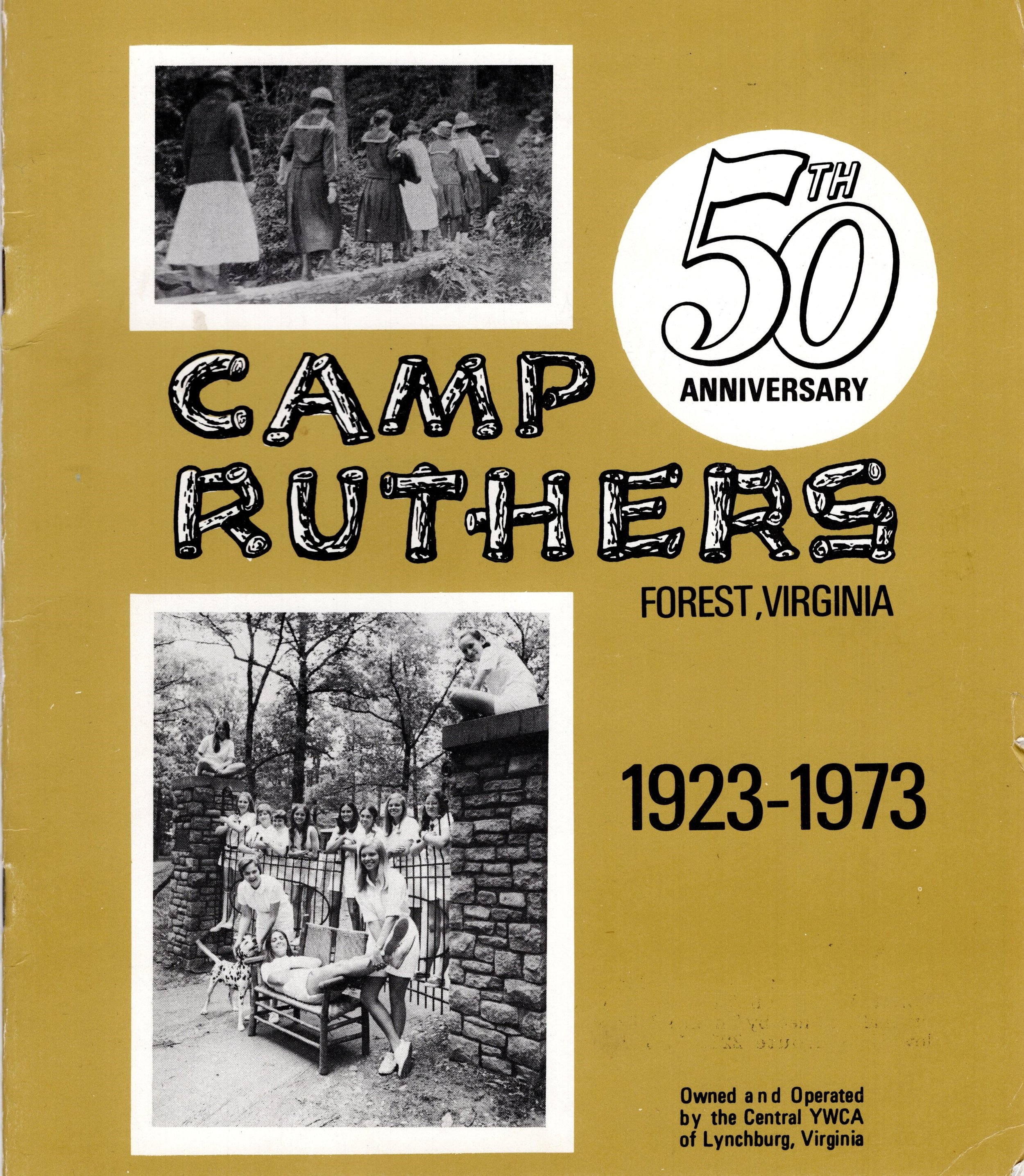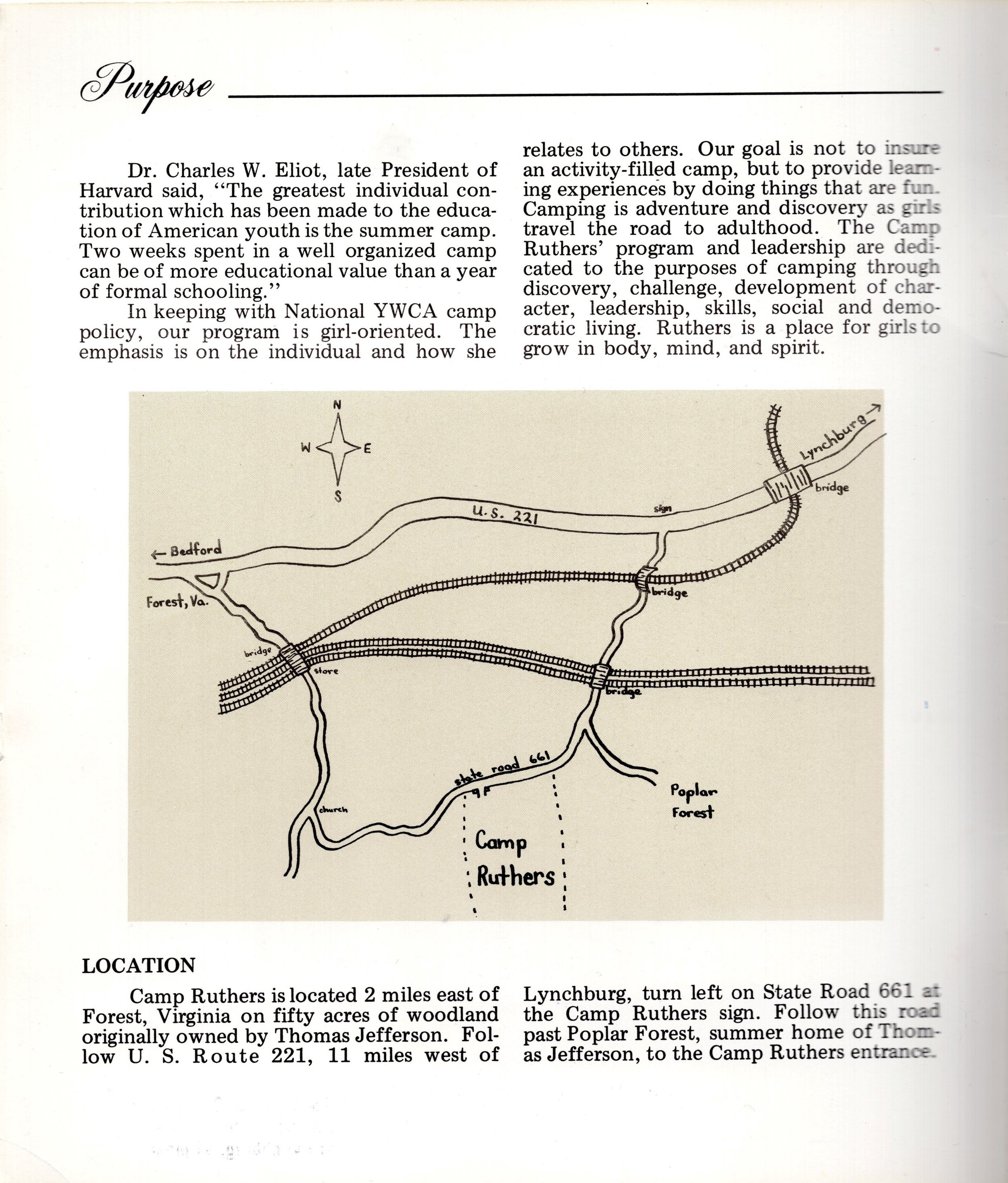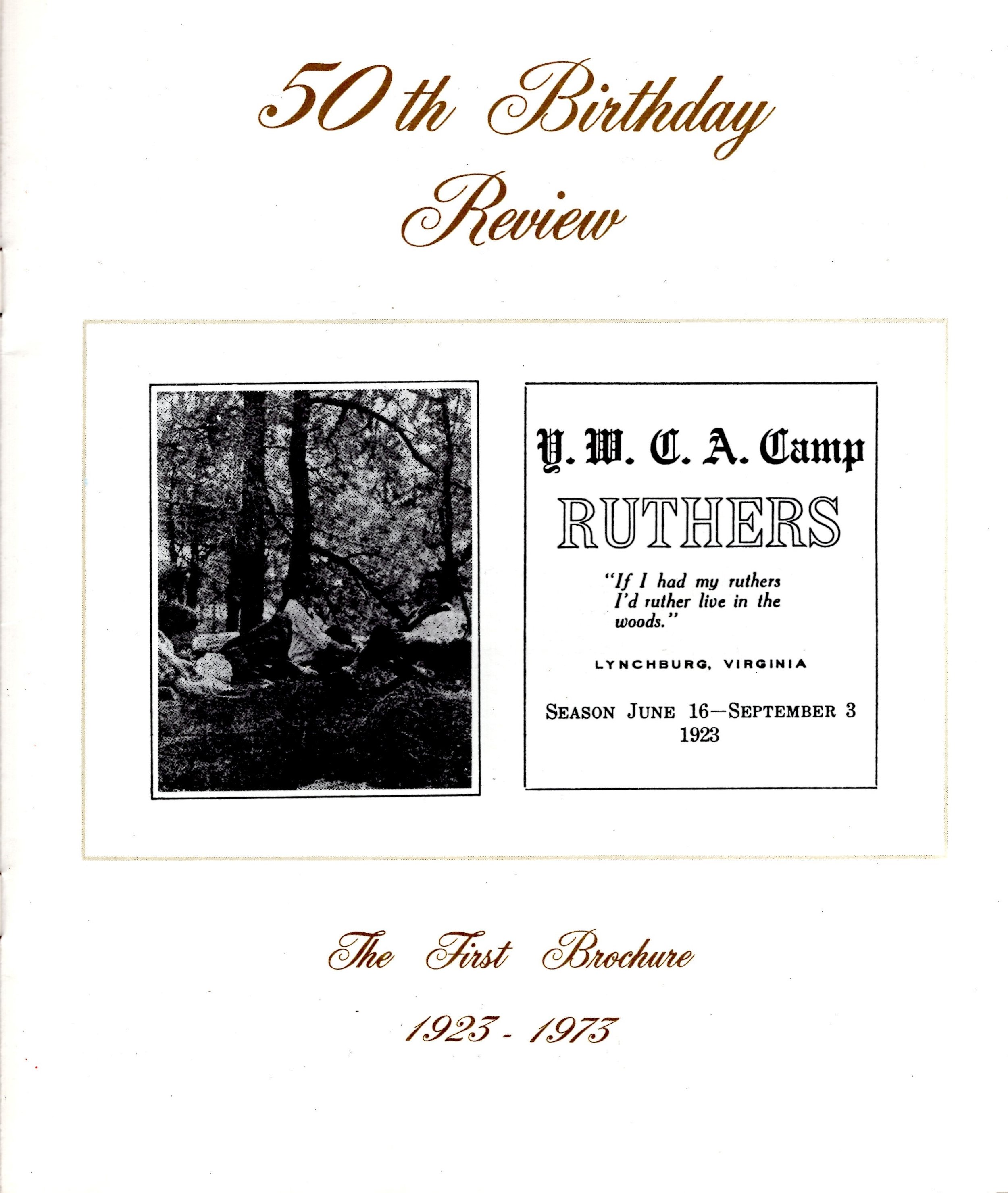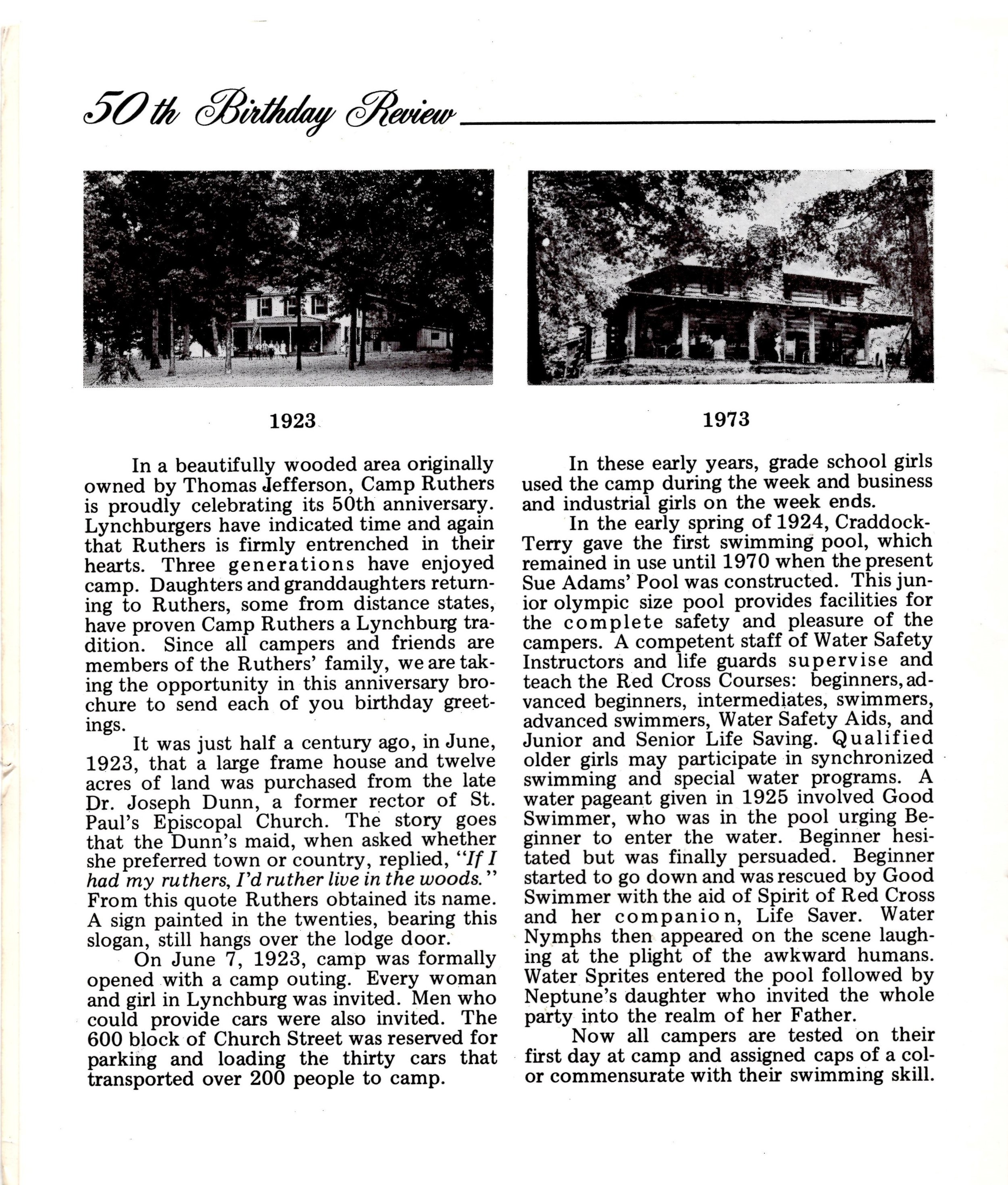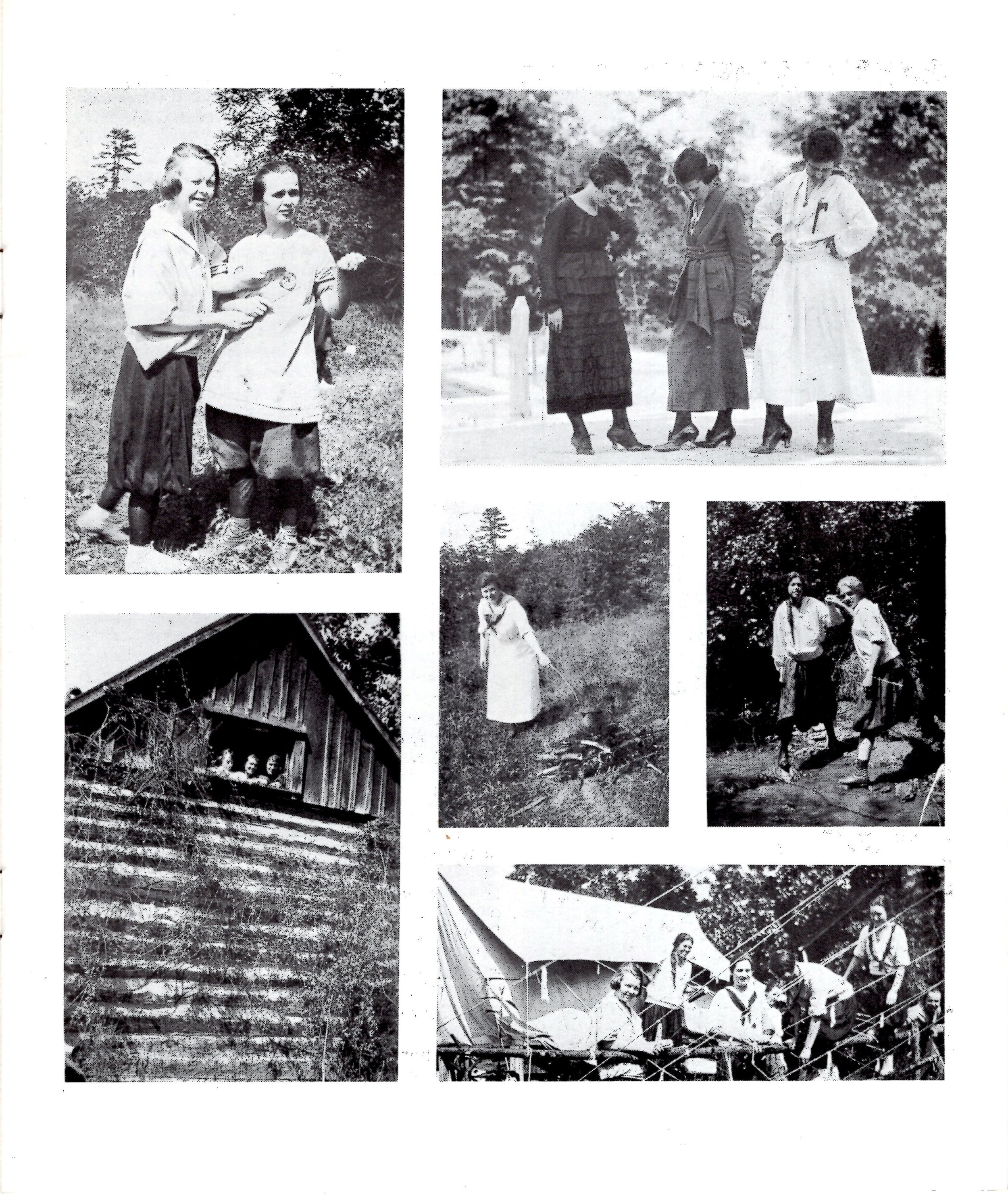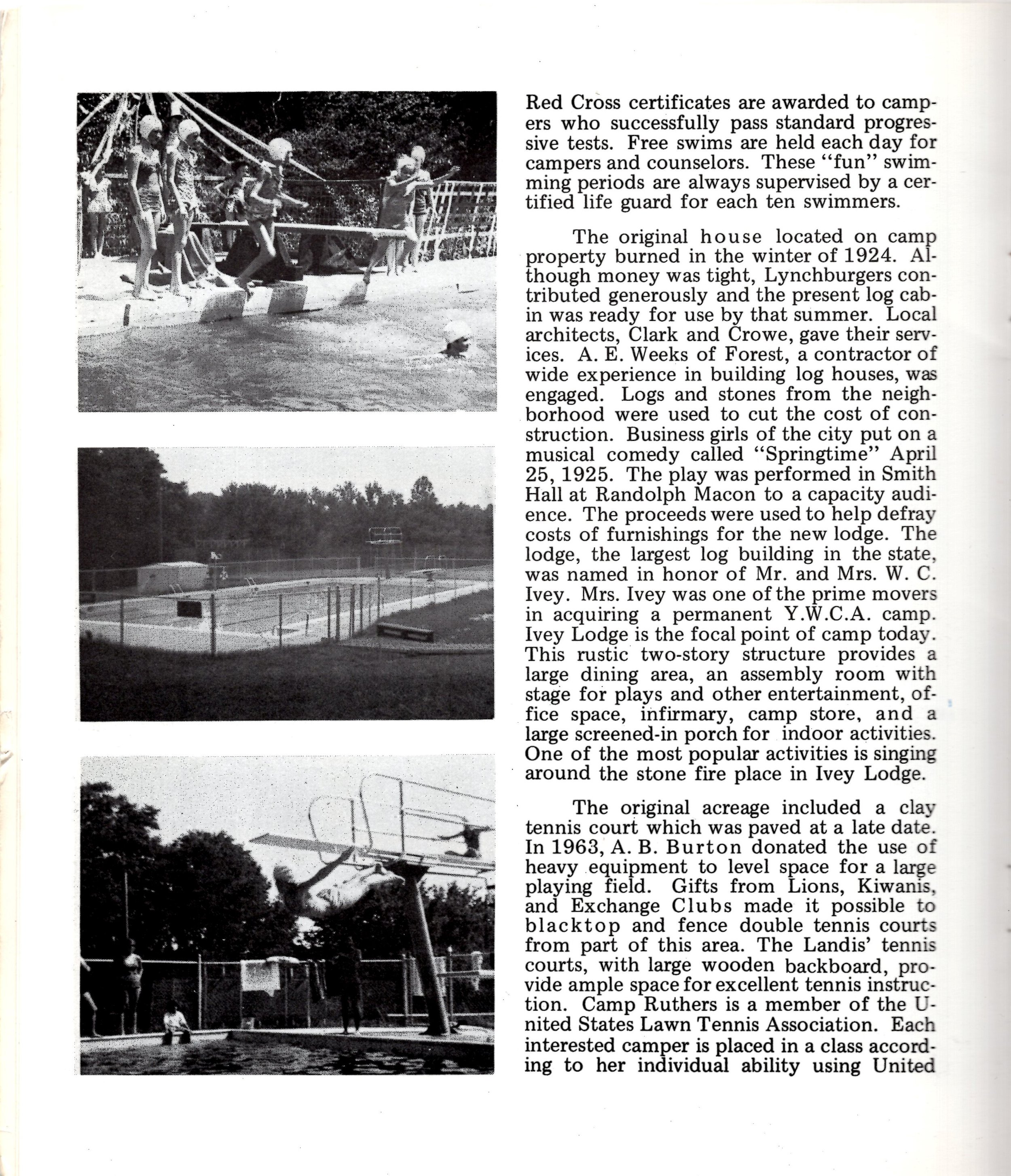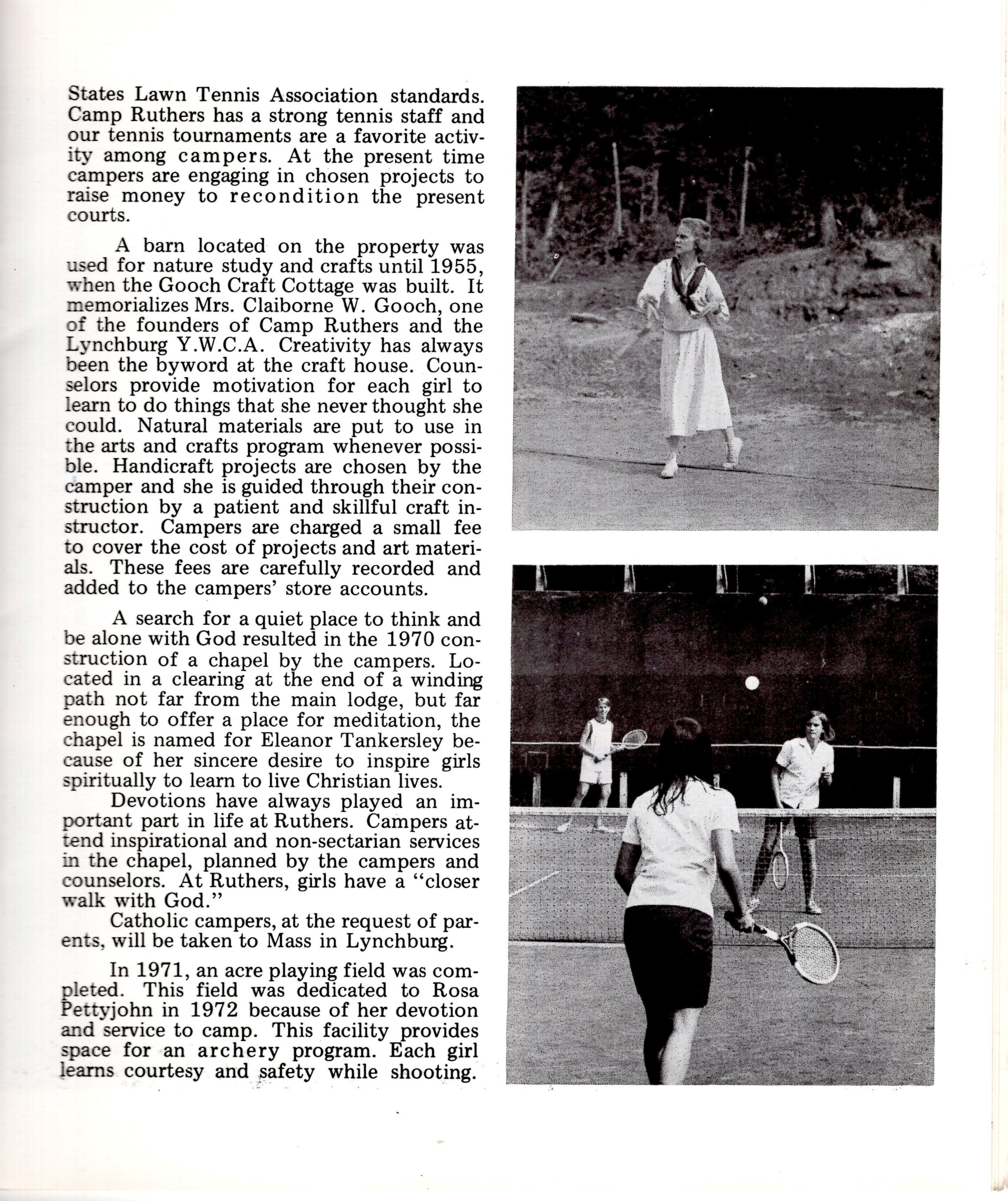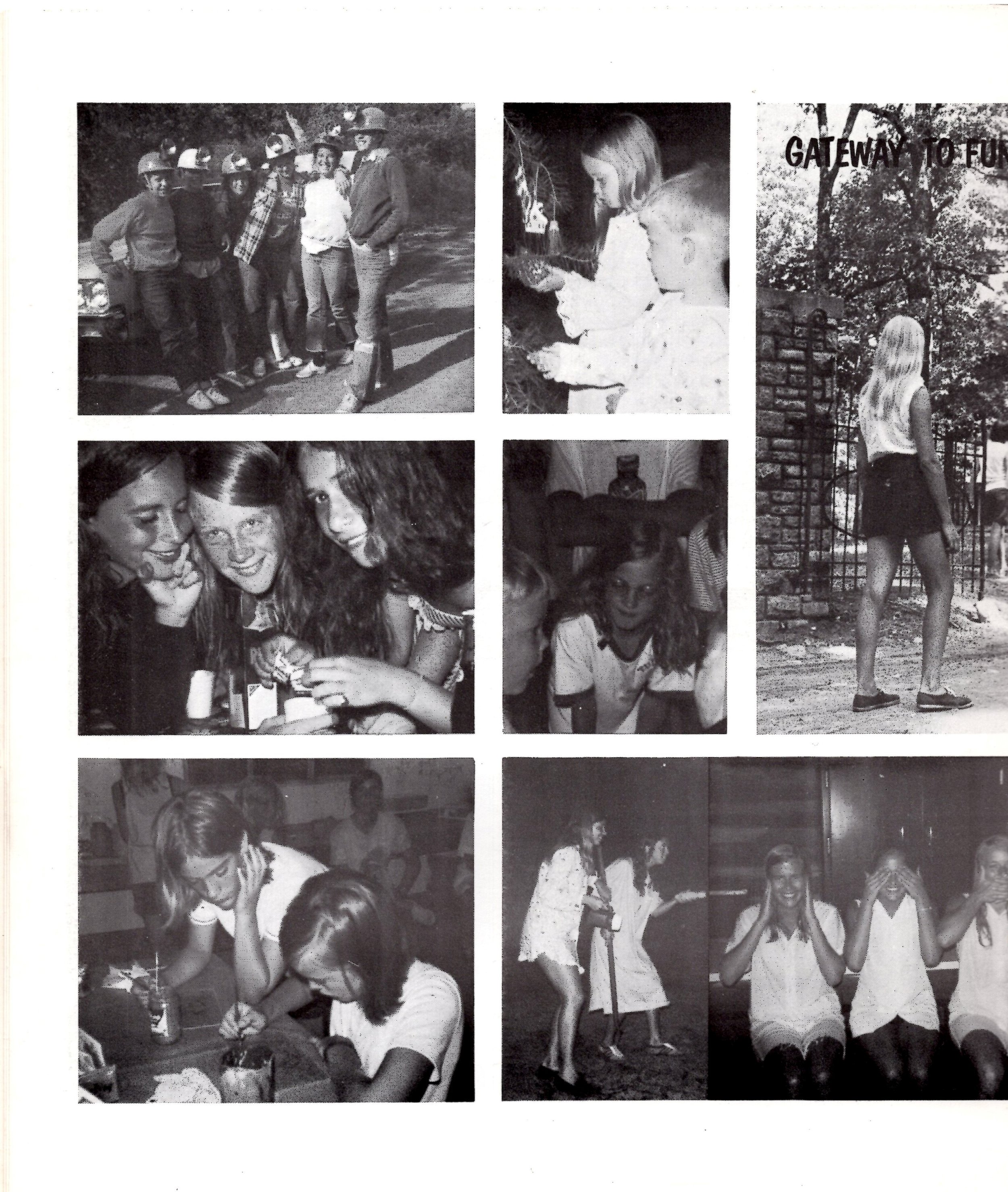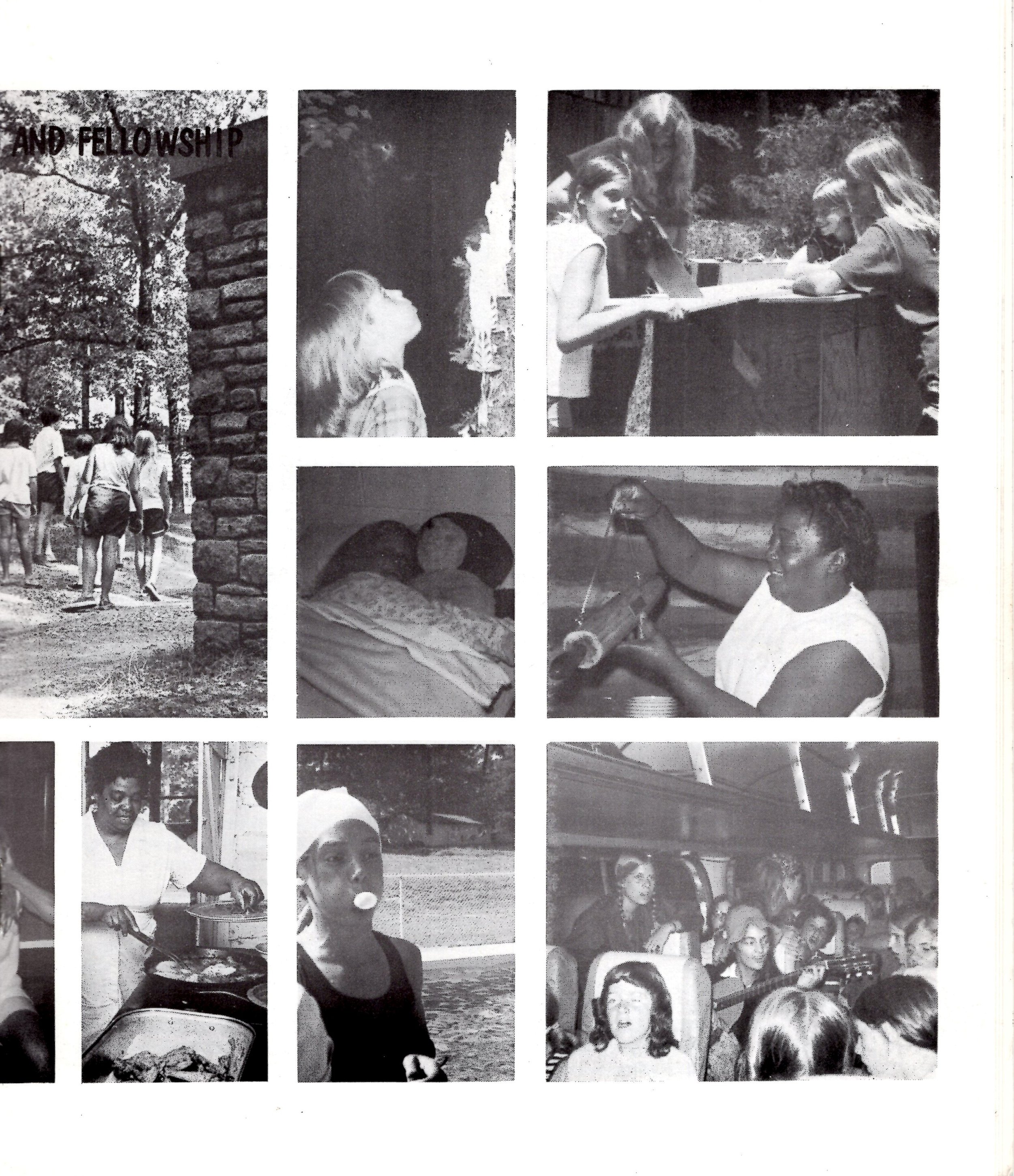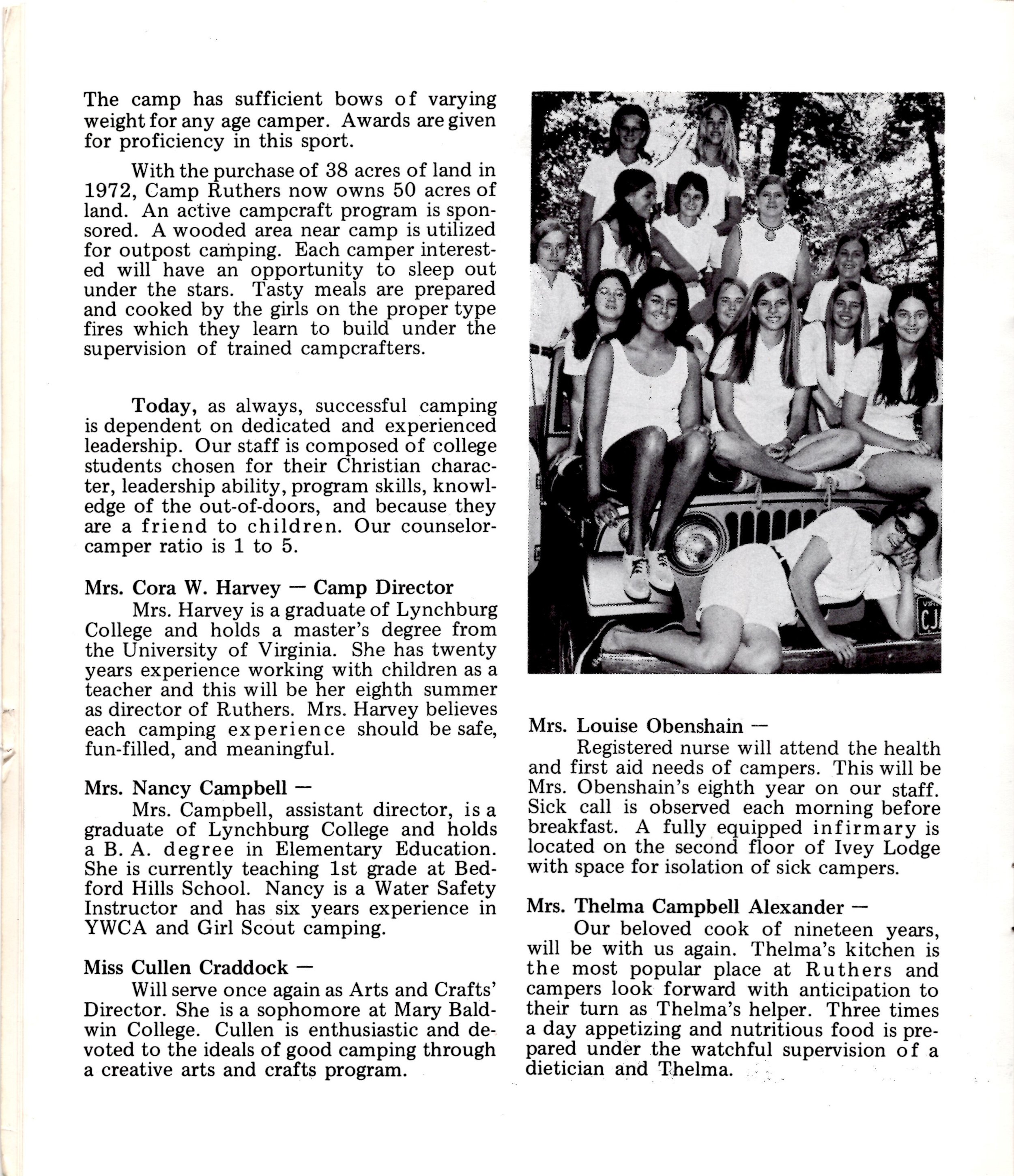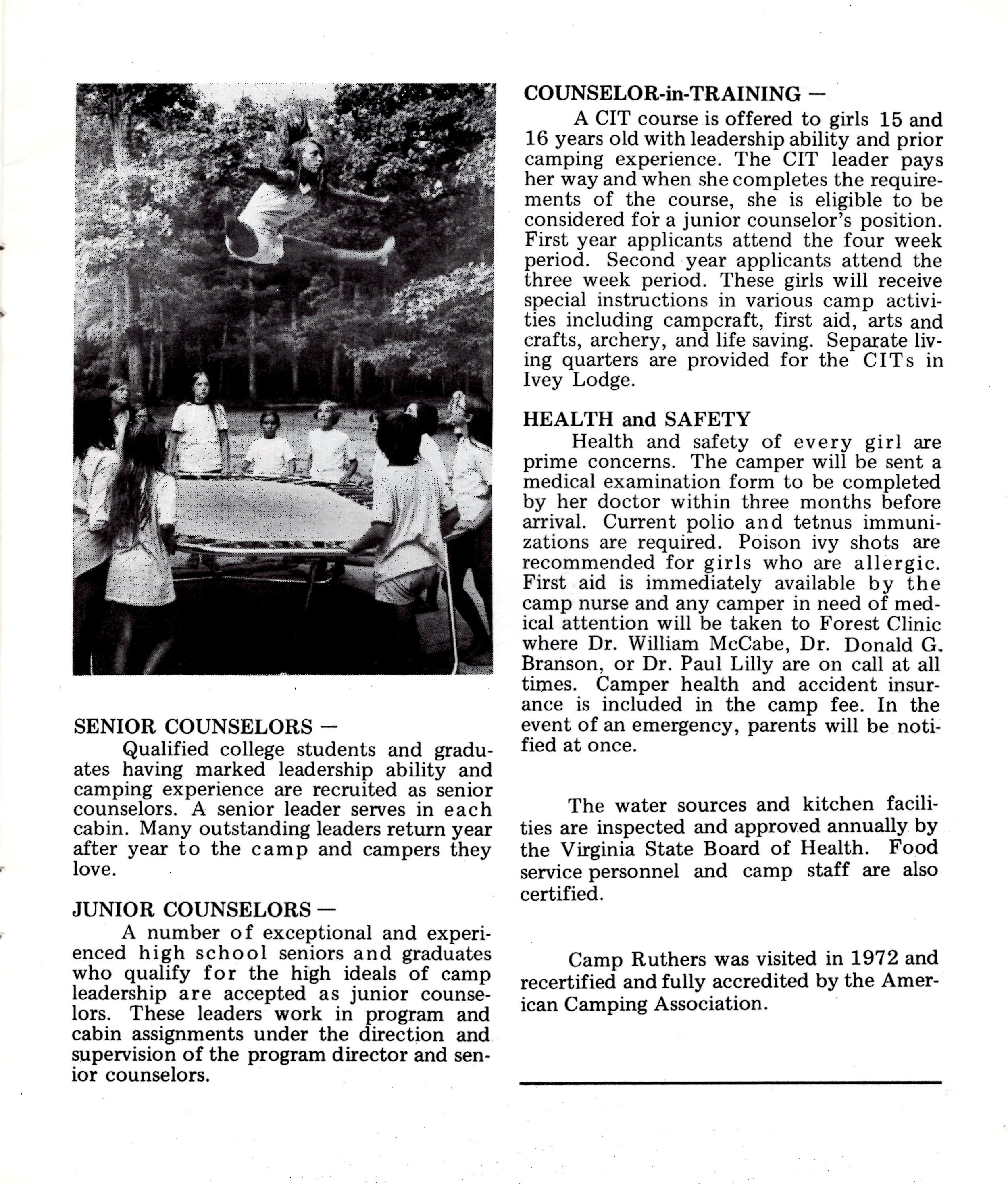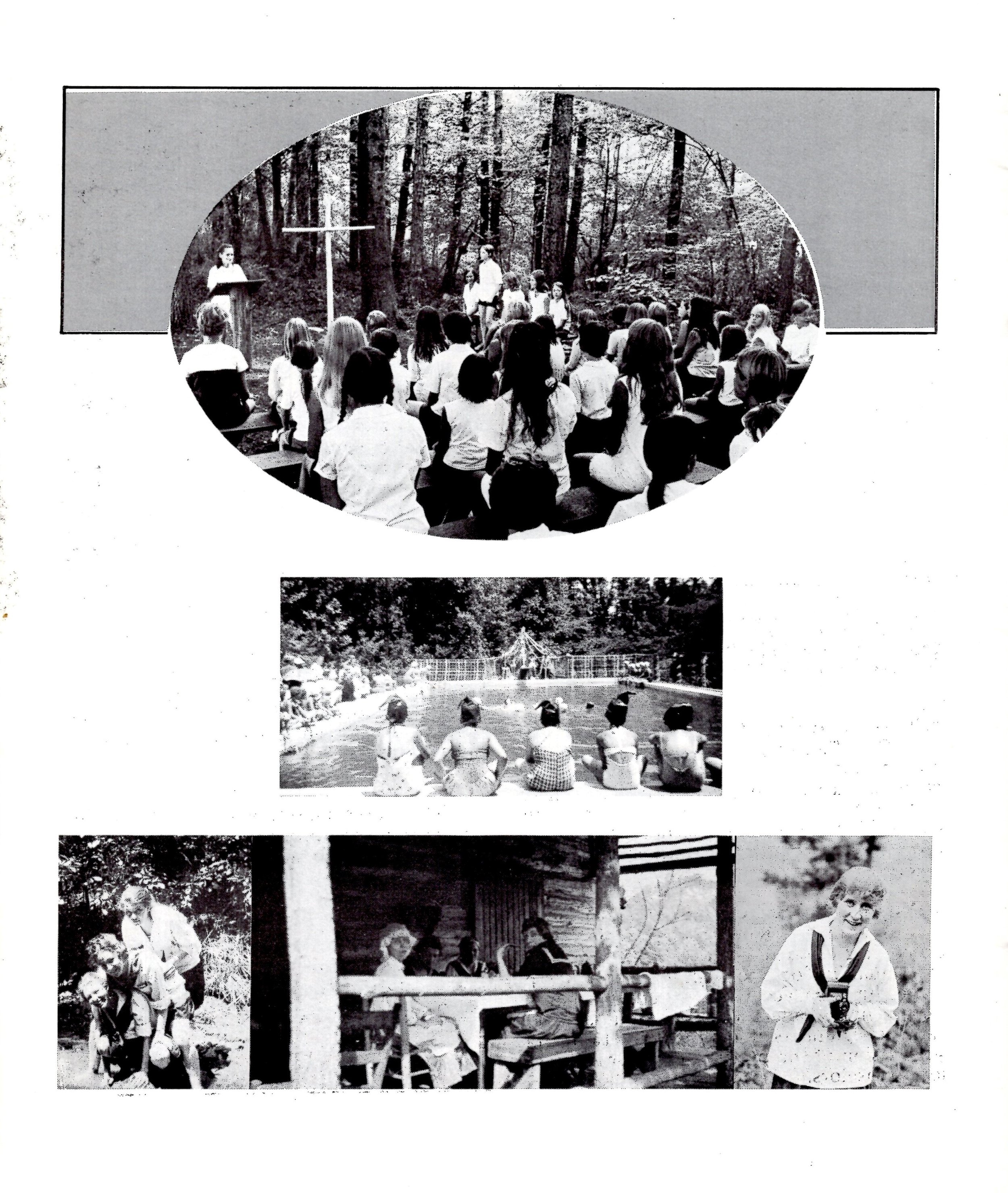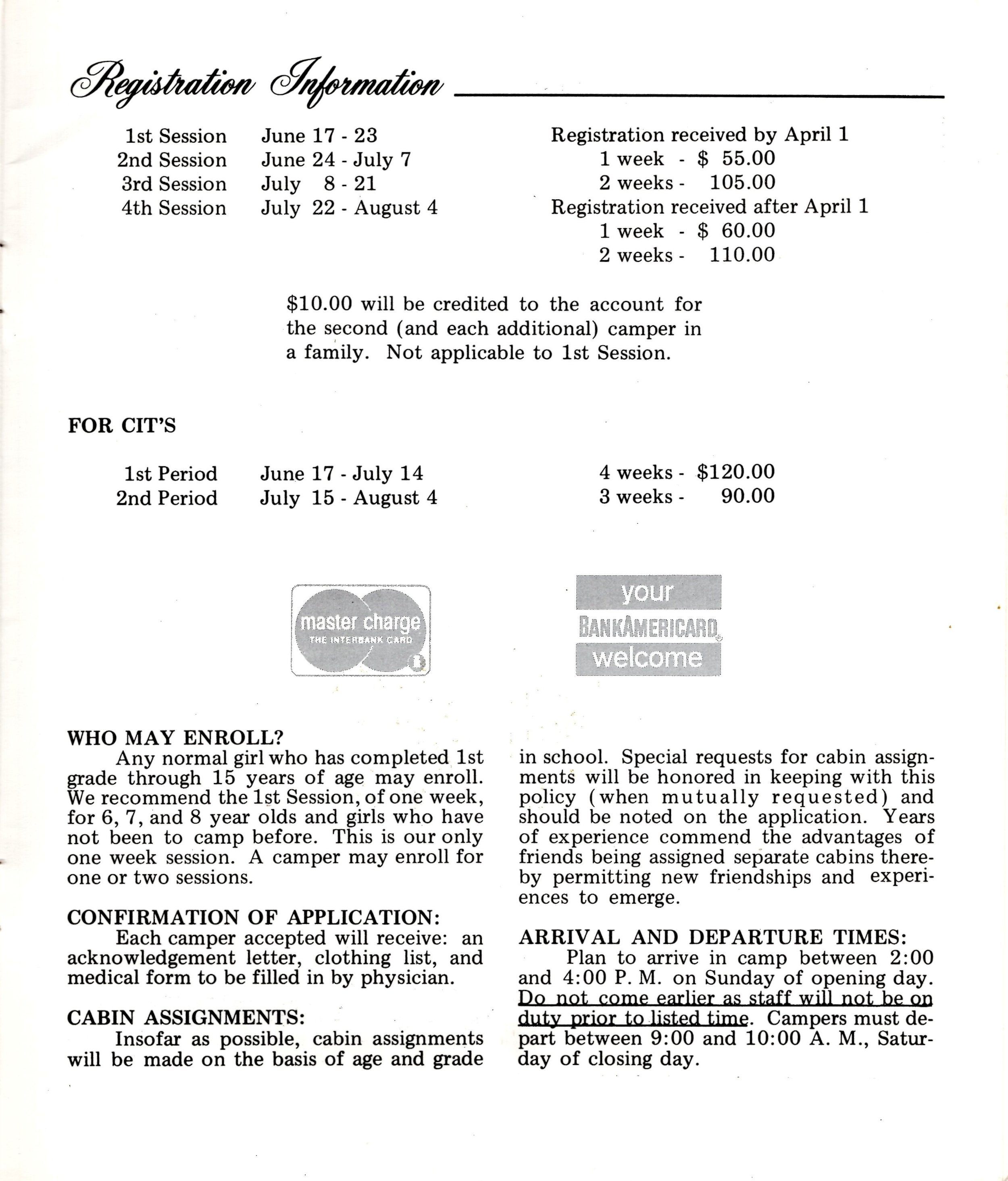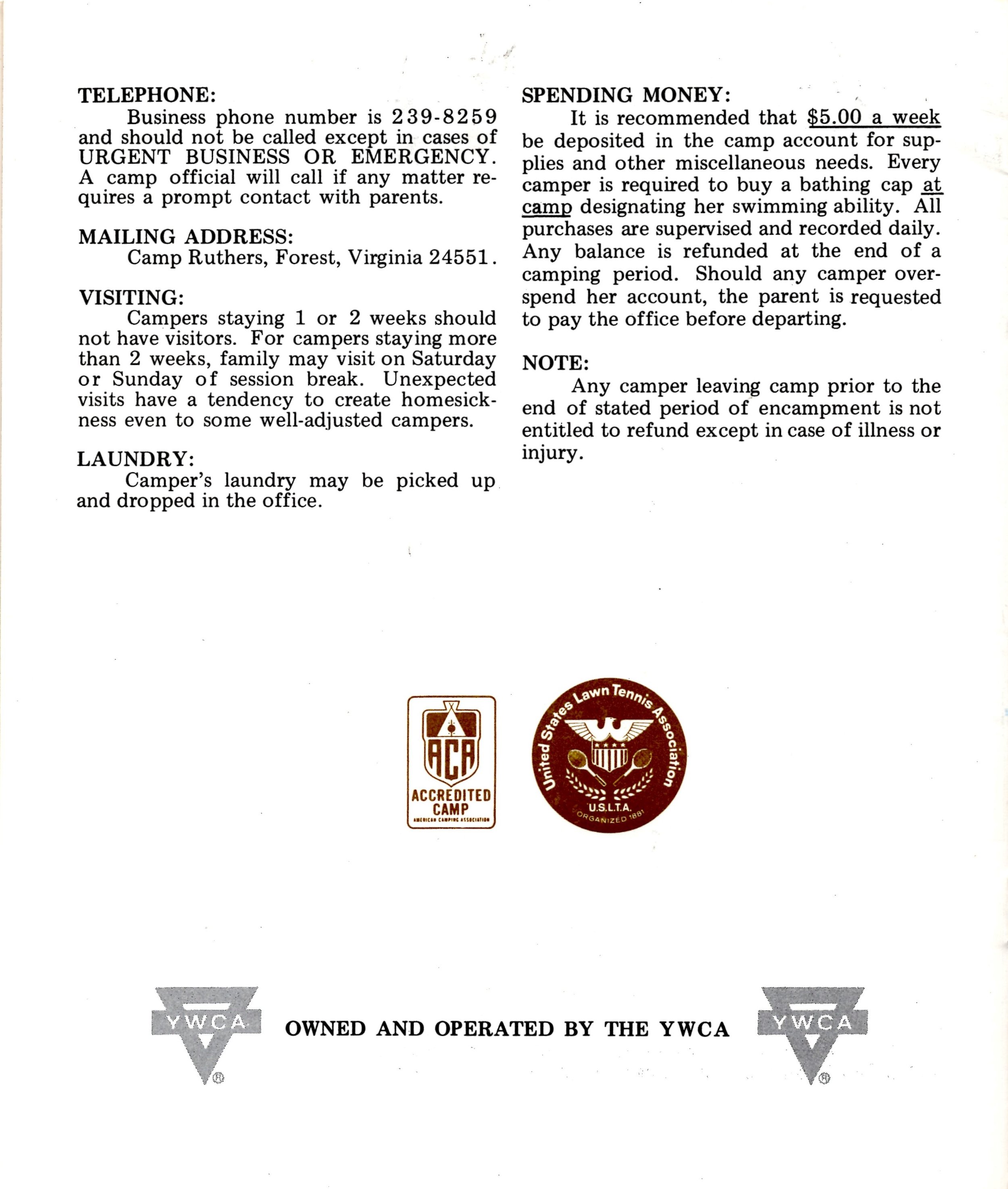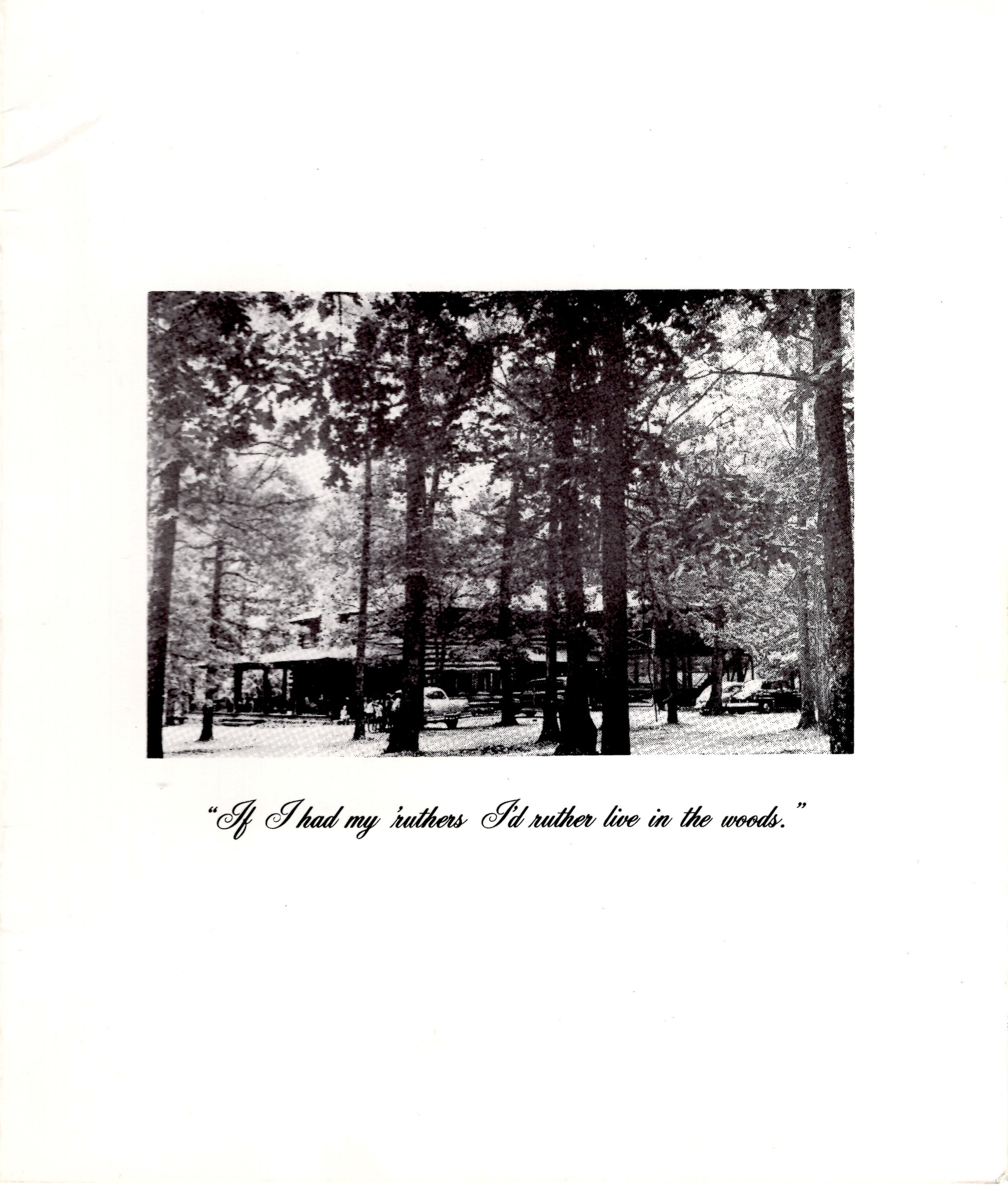Exhibit Curated by Laura Crowe
Digitized by Austin Gaebe and Laura Crowe
Introduction
The history of the YWCA in the United States stretches back to the 1850s. The first two U.S. Young Women's Christian Association (YWCA) chapters formed in New York City and Boston in 1858 and 1859, respectively, and the Boston chapter was the first to officially use the “Young Women’s Christian Association” title. Much of the YWCA’s early work was in response to the poor urban living and working conditions for women and children during the American Industrial Revolution. Some of the major goals of the YWCA were to house and provide resources to women who had left their hometowns to work in the city. The Young Women’s Christian Association of The United States was formed in 1906, which created a centralized national organization that still exists today as YWCA USA.
YWCA Central Virginia was founded in Lynchburg in 1912, known then as the Young Women’s Christian Association of Lynchburg, Virginia. It was in May of that year that a meeting was led by Miss Anna D. Casler, the Field Secretary of the South Atlantic, to discuss the possibility of forming a YWCA in Lynchburg. 300 members were pledged to this fledgling organization after a preliminary membership committee was appointed. The Young Women's Christian Association of Lynchburg, Virginia officially organized on November 23, 1912 and was affiliated on December 4, 1912. The Lynchburg YWCA’s first elected president was Emma W. Ivey, and the organization had an initial membership of 700.
The News, Sunday Morning Edition, May 11, 1919
This newspaper describes the opening and dedication of the Church Street YWCA Building in 1919.
Courtesy of YWCA Central Virginia
(left) Church Street Building, “Smoking Deck”
This photo depicts a woman standing on the outdoor balcony at the Church Street YWCA Building known as the “Smoking Deck.”
Courtesy of YWCA Central Virginia
(right) Unnamed volunteer at Phyllis Wheatley YWCA
Courtesy of YWCA Central Virginia
YWCA and Religion
As the name suggests, the YWCA was a deeply Christian organization at its inception, and a large part of the YWCA’s efforts were religious in nature. For many years, only members of a Protestant, evangelical church were permitted to be voting members. In 1946, in an effort to broaden the reach and appeal of the organization, the YWCA of Lynchburg voted to include any white woman 18 years or older to become a voting member if they agreed to the purpose of the organization: “To build a fellowship of women and girls devoted to the task of realizing in our common life those ideals of personal and social living to which we are committed by our faith as Christians.” This decision was at least partly motivated by pressure from Lynchburg’s Catholic community, who threatened to withdraw their contributions to the Community Chest (today known as United Way), which constituted a significant part of the YWCA’s budget. The Lynchburg YWCA, like many other organizations, also excluded women of color for a considerable part of the 20th century, and Lynchburg had a separate African American YWCA Branch until 1978, which was known as the Phyllis Wheatley YWCA.
By the 1960s, the YWCA’s policy on religious affiliation was “Christian but open,” and while Christian values were still encouraged, Christianity was not a stipulation for membership. The Mission Statement adopted at the 1991 YWCA Convention in Atlanta, Georgia was:
The Young Women’s Christian Association of the United States of America is a women’s membership movement nourished by its roots in the Christian faith and sustained by the richness of many beliefs and values. Strengthened by diversity, the Association draws together members who strive to create opportunities for women’s growth, leadership and power in order to attain a common vision: Peace, justice, freedom and dignity for all people.
The YWCA ultimately expanded its bylaws to include women from all backgrounds and beliefs, and since 2009 the mission has been:
YWCA is dedicated to eliminating racism, empowering women and promoting peace, justice, freedom, and dignity for all.
In 2015, the national organization's name was formally changed from “Young Women's Christian Association of the United States of America, Inc.” to “YWCA USA, Inc.” to better reflect its diversity of membership.
These changes were not always met with immediate approval. Below is an excerpt of a 1939 letter from an officer of the Lynchburg YWCA to the president of the national board of the YWCA, Mrs. John French. The letter expresses concerns that some women had in Lynchburg over the loosening of YWCA membership requirements to include non-evangelical members.
“We of the Lynchburg Association are rather disturbed about the Association generally speaking getting away from the definite purpose of the old membership basis and do not quite understand the personal basis that is being urged quite strongly, by some of our staff and Board members. We have many Unitarians, Jews, and Catholics who are active in the Y.W.C.A. programs, but who are not members of the Board and are not supposed to have a vote in the policies of the Association. Now, the personal basis will make Unitarians, Catholics and Jews eligible to the Board and there is a danger, we feel, that our religious progress would be or rather might be developed along lines not evangelical. [...] To me all life is sacred and I have always liked the way the Association has emphasized this through their program. But it seems to me they or we are leaving in the minds of a great many an indefinite faith and belief.”
Photo of Church Street YWCA Building
Courtesy of YWCA Central Virginia
YWCA Church Street Building
The Church Street YWCA Building first opened on May 11, 1919 with a dedication ceremony. The May 11, 1919 edition of The News reported on the event and stated that:
The building is a combination of administration building and boarding home, and presents an appearance that indicates the nature of the organization, with the colonial doorway that invites entrance, the substantial structure that stands for durability; the attractive interior that bespeaks comfort; and the homelike dormitories that tell of individual interest and care.
The Church Street Building has undergone updates and renovations over the past 100 years, but many of the original features remain the same today and it is a familiar landmark to many Lynchburg residents. At its opening, the building included a gymnasium, swimming pool, and cafeteria, and had dormitory space for up to 66. However, the use of these amenities was restricted to white women only.
When the Lynchburg YWCA moved into its new Church Street building, membership was at 1,000, and the association had eight departments, “Religious, Educational, Industrial, Girls’ Work, Travelers’ Aid, Physical, Cafeteria, and Colored Work.” In 1919 their officers were:
Mrs. C. W. Gooch – President
Mrs. W. C. Ivey – First Vice-President
Mrs. F. S. Kirkpatrick – Second Vice-President
Miss Francis Allen – Recording Secretary
Mrs. W. A. Woodroof – Corresponding Secretary
Mrs. Julia Lalvinder – Treasurer
Program from Dedication of New Building for the Young Women’s Christian Association of Lynchburg, Virginia, 1919
Courtesy of YWCA Central Virginia
Church Street YWCA Leaflet, October 19, 1929
“Membership in the Local Association makes you a part of the National and World Associations.”
Courtesy of YWCA Central Virginia
Receipt from Dormitory Stay at Church Street YWCA, May 19, 1935 (above left)
A tongue-in-cheek receipt filled in from a stay at the YWCA.
Courtesy of YWCA Central Virginia
Basketball Ticket (above right)
“Y.W.C.A. vs. Petersburg High School Saturday, April 27, 1918, 8:15 P.M., Admission 25 Cents”
Courtesy of YWCA Central Virginia
Photo with Schematics of Main Church Street Facility
Courtesy of YWCA Central Virginia
Phyllis Wheatley YWCA Branch
In 1918, a Blue Triangle Club was formed by a group of black women in Lynchburg in order to provide a safe place for women and girls of color to gather for education, recreation, and community. Because the YWCA was not open to African American women and girls this Blue Triangle Club was started to fill those needs. According to records kept by the YWCA, the poet Anne Spencer was one of the women who helped to form the club.
The Lynchburg Blue Triangle Club was the precursor to the Phyllis Wheatley YWCA branch in Lynchburg, which was a name shared by a number of African American YWCA branches in the US – named for the celebrated poet, Phillis Wheatley. This was in the middle of the Jim Crow era, and Lynchburg, like much of the country, was still firmly segregated – including the YWCA. These branches were a reflection of the infamous “separate but equal” doctrine, which maintained the constitutionality of racial segregation until 1964. African American YWCA branches had an official affiliation with the YWCA, but did not have equal status. In 1919 the Blue Triangle Club rented a building at 613 Monroe Street and the following year changed their name to the Phyllis Wheatley YWCA Branch. In 1920, the Phyllis Wheatley YWCA had the following officers:
Mrs. Nannie Johns – President
Mrs. J. Evans – Treasurer
Mrs. Carrie Harper – Chairman of Finance Committee
Miss E. C. Arnold – Executive Secretary
Photo of original Phyllis Wheatley YWCA Building,
Courtesy of YWCA Central Virginia
Scrapbook pages from the Phyllis Wheatley YWCA with photos from “Y-Teen” Week
Courtesy of YWCA Central Virginia
Booklet for “New” Phyllis Wheatley Building on Monroe Street
Courtesy of YWCA Central Virginia
Due to the deteriorating condition of the original Phyllis Wheatley building, another building was purchased on Monroe Street and the Phyllis Wheatley branch had moved to that location by 1959.
Commemorative Sticker from Phyllis Wheatley YWCA
Courtesy of YWCA Central Virginia
Civil Rights and the YWCA
On a national level, there are examples of the YWCA’s integration efforts from early in their history. The YWCA first held an integrated meeting in Kentucky in 1915. In 1936, the national convention established the goal “to create a fellowship in which barriers of race, nationality, education and social status are broken down in the pursuit of a better life for all.” The Interracial Charter was adopted by the YWCA of the USA in 1946, stating that “wherever there is injustice on the basis of race, whether in the community, the nation, or the world, our protest must be clear and our labor for its removal vigorous and steady.” In 1958, the national board voted to intensify its efforts to desegregate the organization at all levels. Despite these statements, the YWCA remained largely segregated until the Civil Rights Act of 1964. In 1970, the YWCA USA established their One Imperative: “To thrust our collective power towards the elimination of racism, wherever it exists, by any means necessary.”
In 1978, the Church Street and Phyllis Wheatley branch merged to become a single organization: what we know today as the YWCA Central Virginia.
Today’s Mission: “YWCA Central Virginia is dedicated
to eliminating racism, empowering women and promoting
peace, justice, freedom and dignity for all.”
Camp Ruthers
Camp Ruthers was purchased by the Lynchburg YWCA in 1923. The camp was described in The Virginia Teacher, Volume VI in 1925 as follows:
Camp Ruthers is located in Forest, Virginia, eleven miles from Lynchburg. Twelve acres of lovely woods and open fields are included in the camp property. This camp is not located on the water, but a large swimming pool has recently been constructed. From the folder sent out by the Lynchburg Y.W.C.A. comes this quotation which will explain the name of the camp: “If I had my ruthers, I'd ruther live in the woods.”
Camp Ruthers Patch
Gift of Mrs. Winelda Hall, 97.41.5
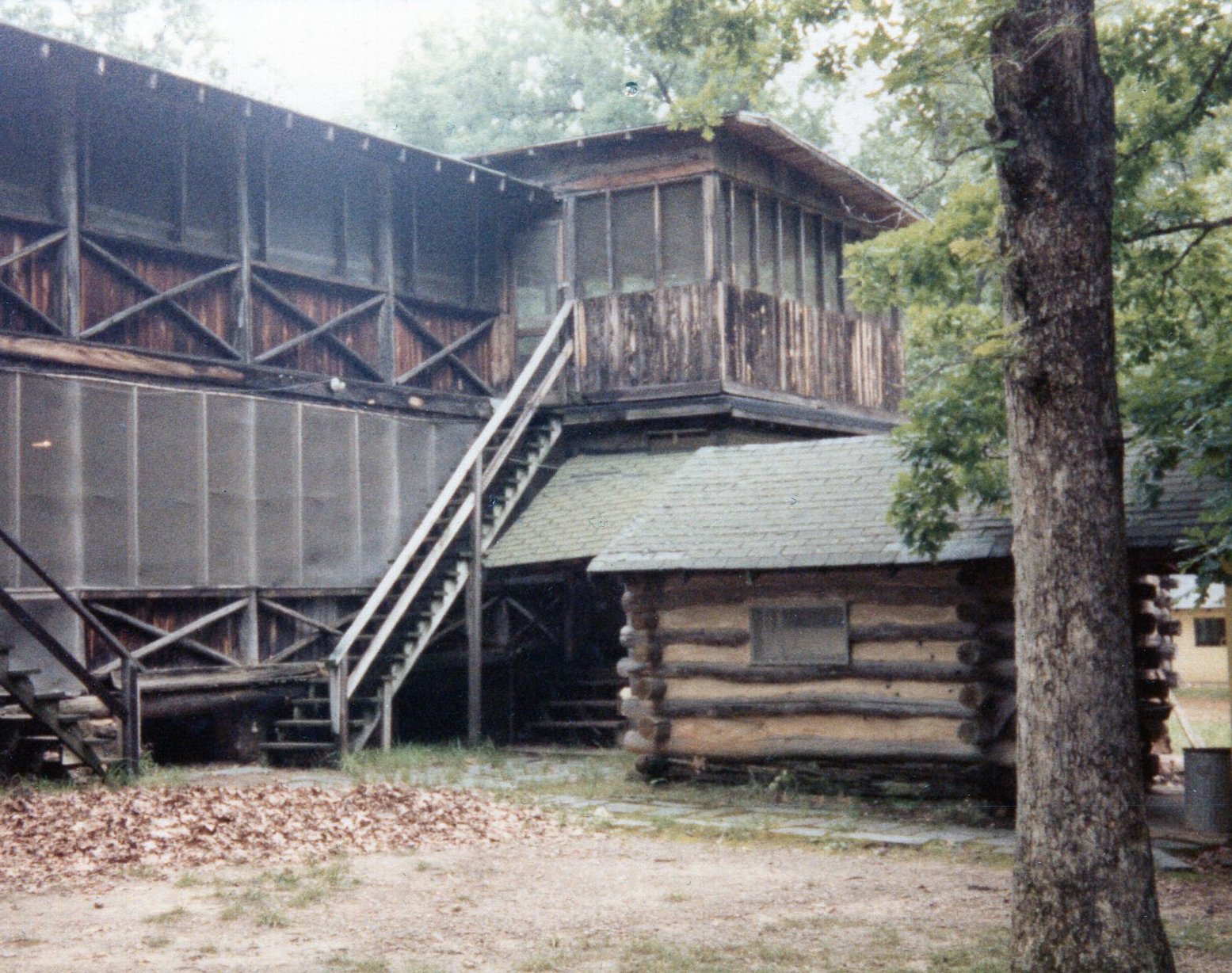
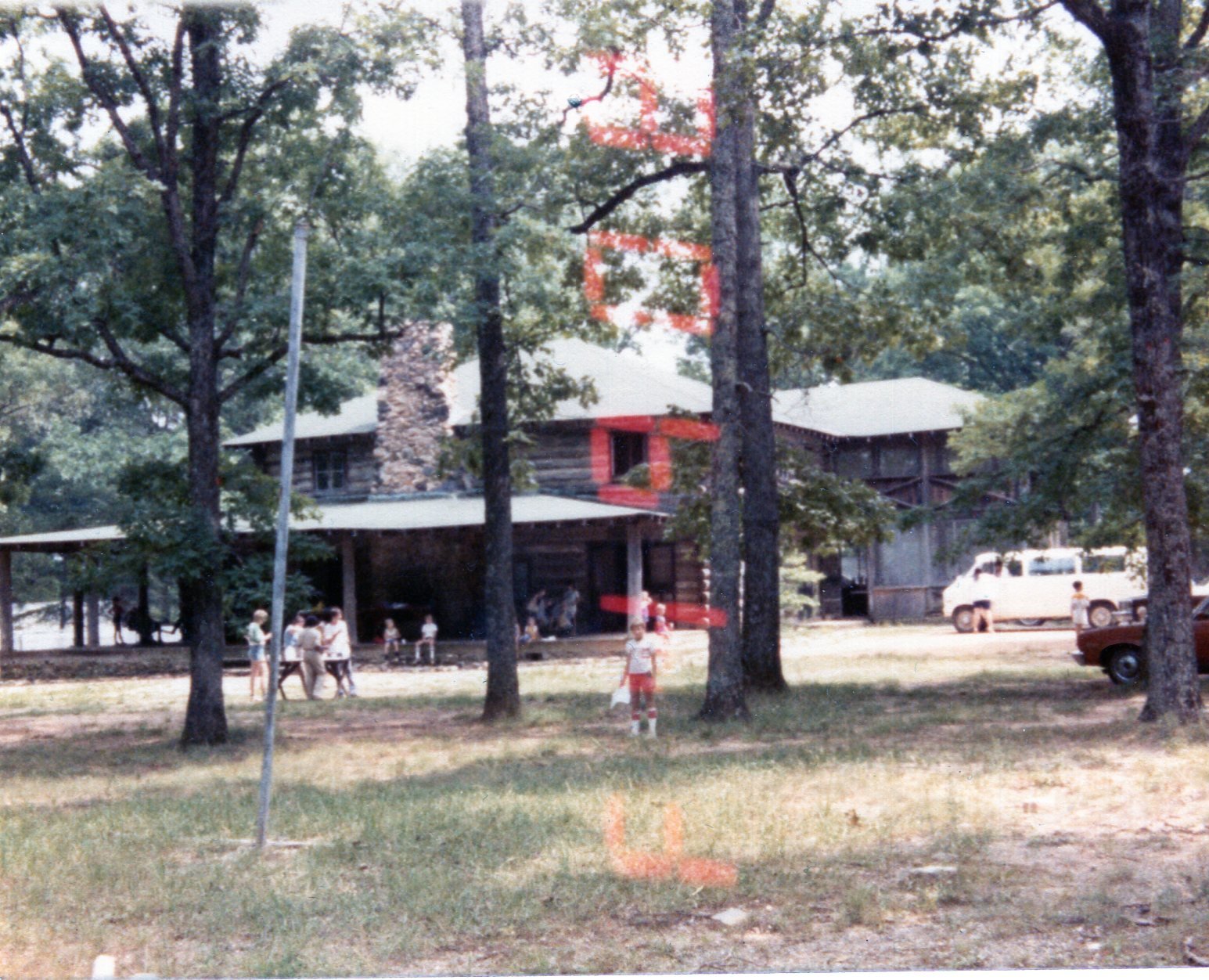
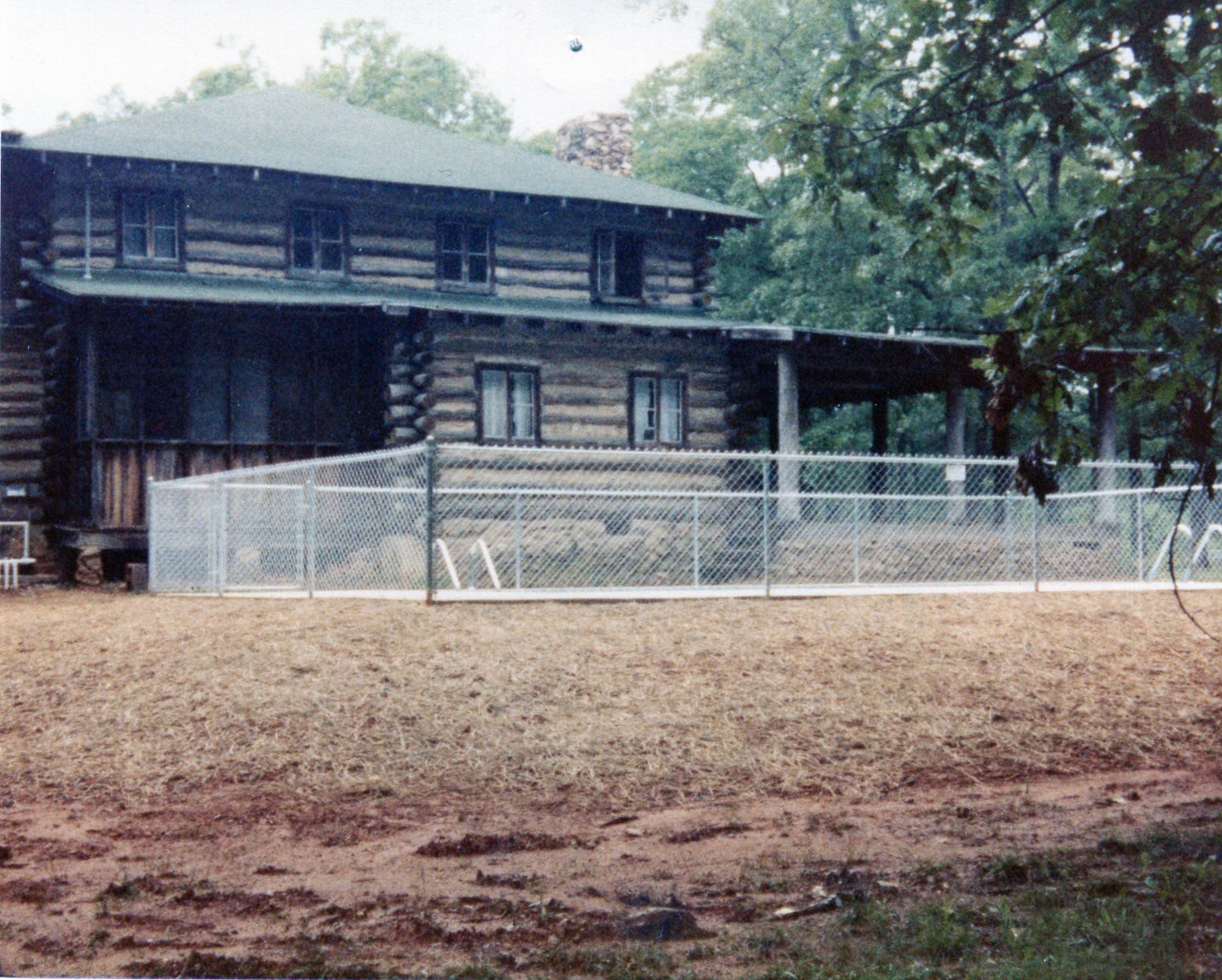
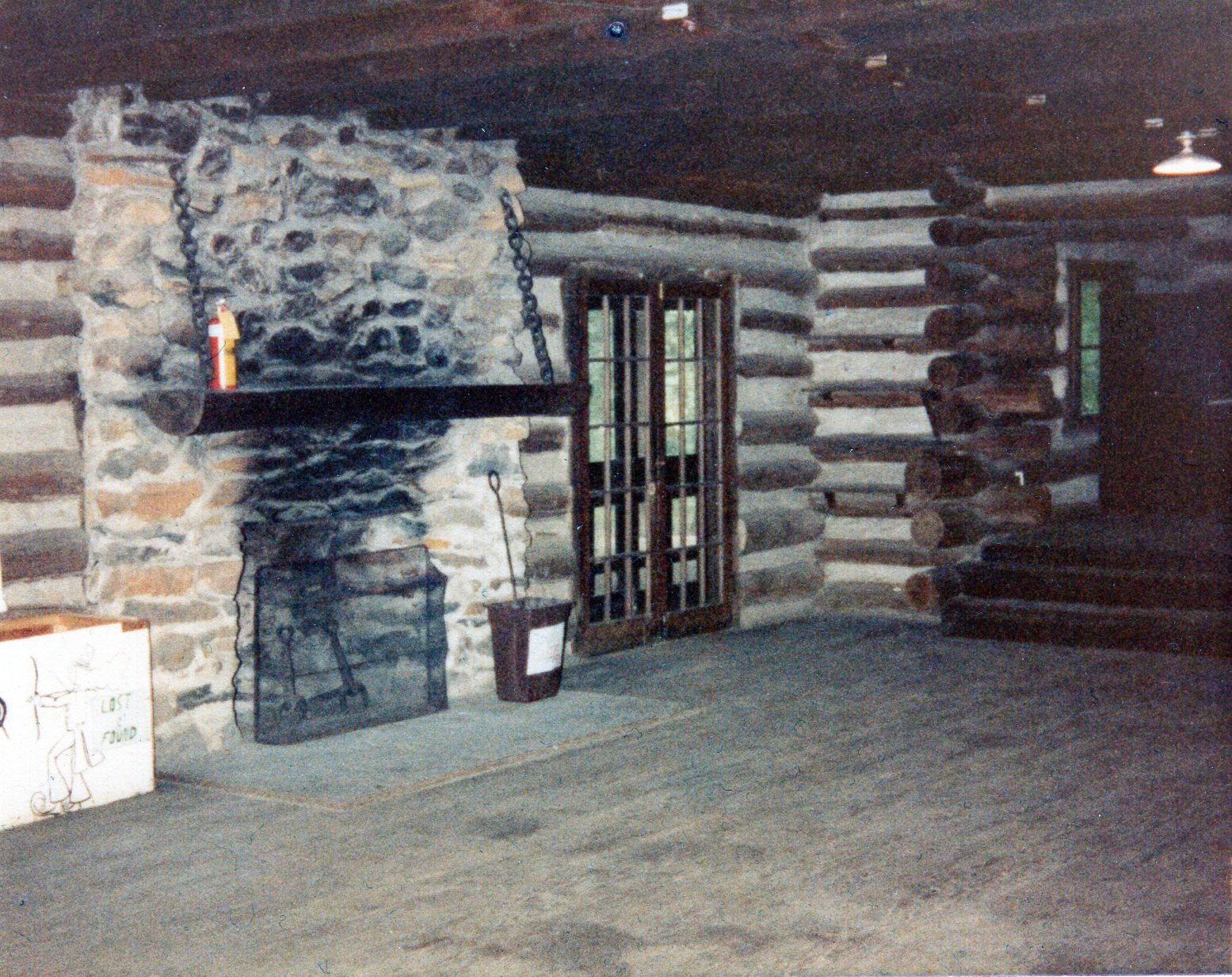
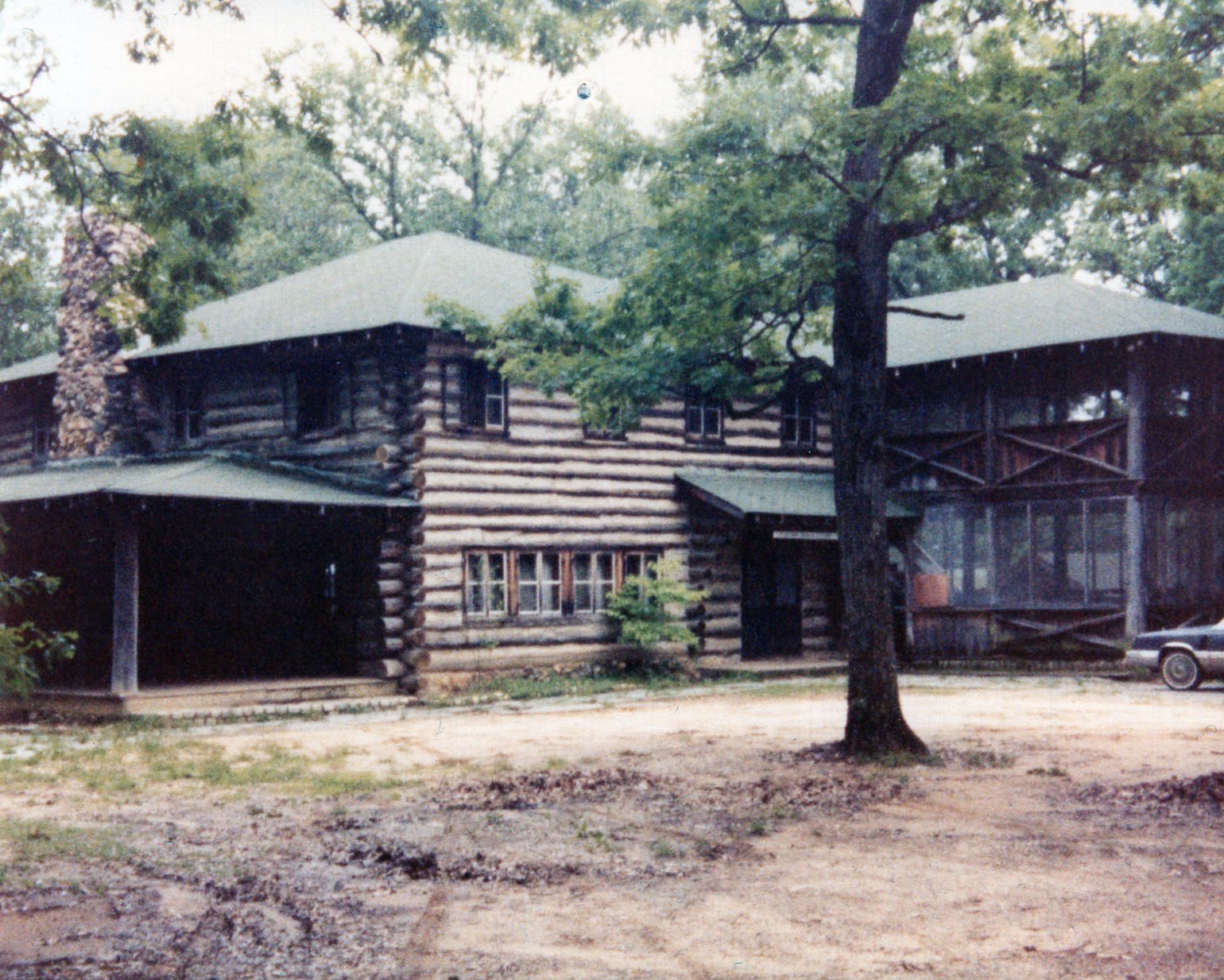
Photos of Camp Ruthers
Courtesy of YWCA Central Virginia
Camp Ruthers Informational Booklet
This mailer describes the programs and amenities offered at Camp Ruthers during its 50th year of operation.
Courtesy of YWCA Central Virginia
Share Your History!
Do you have any photographs, memorabilia, letters, or stories related to the Lynchburg YWCA or the Phyllis Wheatley YWCA? Please share them with us! The Lynchburg Museum System is actively seeking material to illustrate the full history of our city.
Call (434) 455-6226 or email curator@lynchburgmuseum.org
